Effectiveness of Mentorship during Induction for New Recruits' Attitude towards Retention and Performance
VerifiedAdded on 2023/03/29
|25
|6989
|370
AI Summary
This research project evaluates the impact of mentorship during the process of induction on the attitude of new employees towards performance and retention. It discusses the importance of mentorship, its impact on attitude, and recommends processes to improve mentorship during induction.
Contribute Materials
Your contribution can guide someone’s learning journey. Share your
documents today.
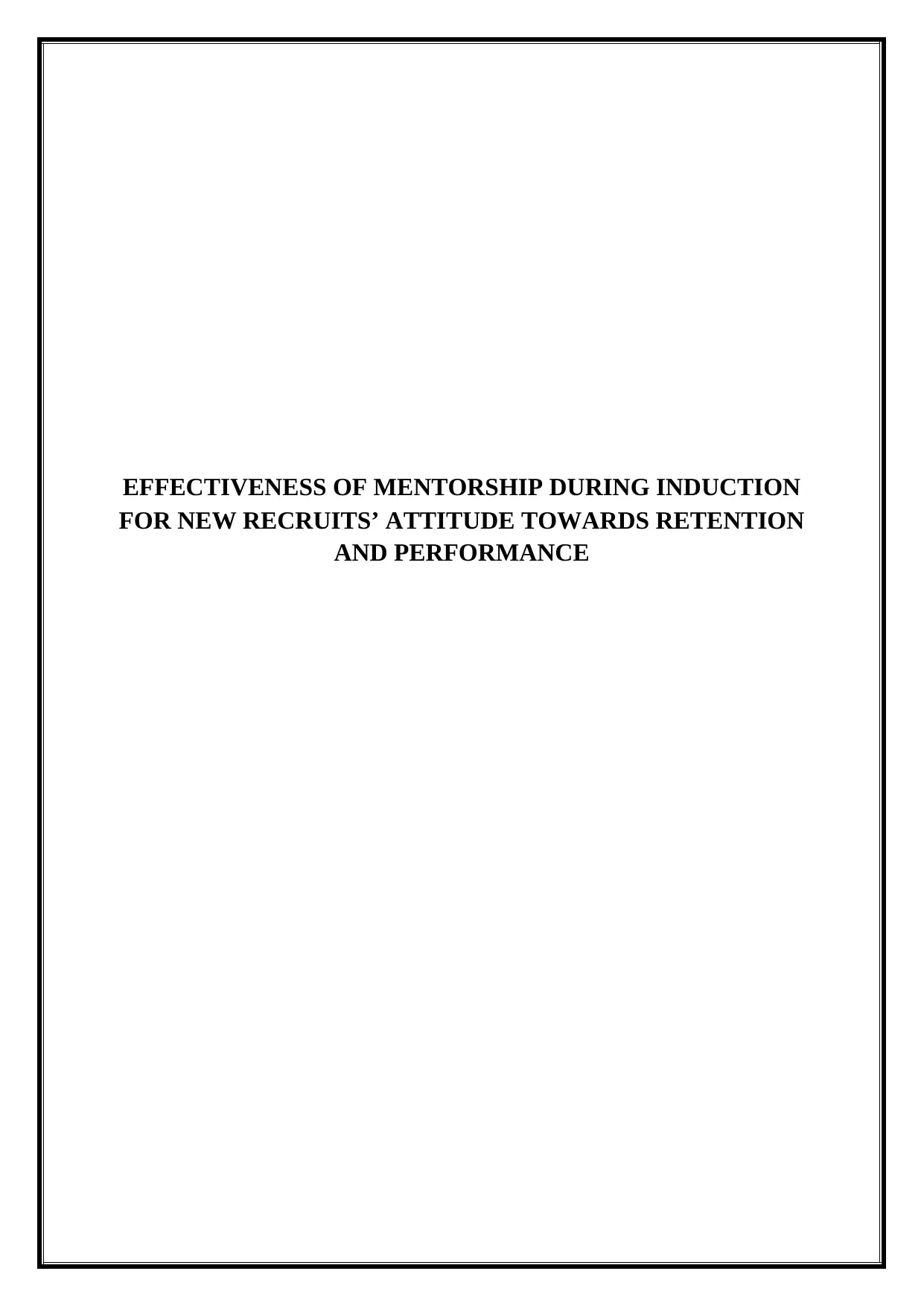
EFFECTIVENESS OF MENTORSHIP DURING INDUCTION
FOR NEW RECRUITS’ ATTITUDE TOWARDS RETENTION
AND PERFORMANCE
FOR NEW RECRUITS’ ATTITUDE TOWARDS RETENTION
AND PERFORMANCE
Secure Best Marks with AI Grader
Need help grading? Try our AI Grader for instant feedback on your assignments.
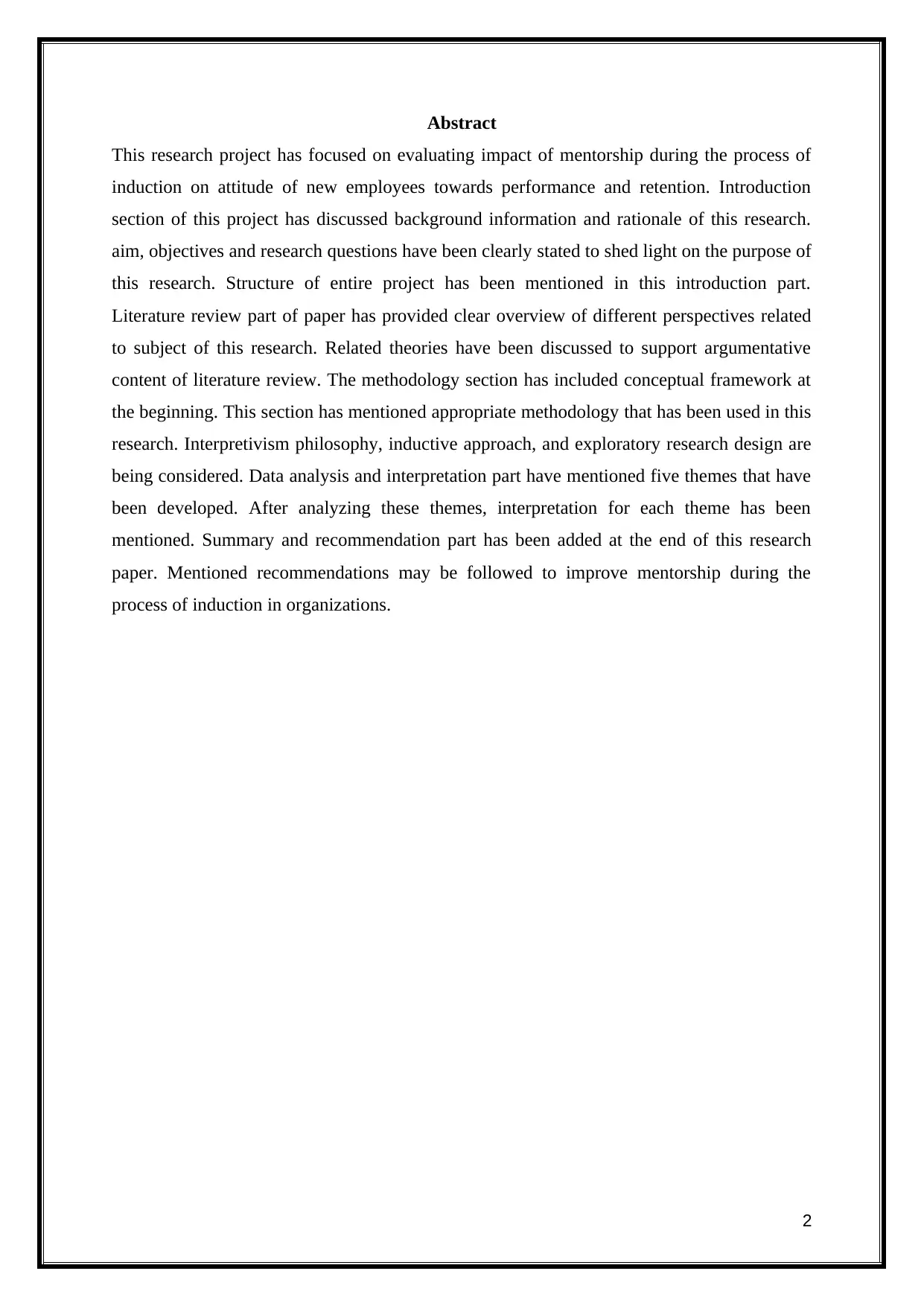
Abstract
This research project has focused on evaluating impact of mentorship during the process of
induction on attitude of new employees towards performance and retention. Introduction
section of this project has discussed background information and rationale of this research.
aim, objectives and research questions have been clearly stated to shed light on the purpose of
this research. Structure of entire project has been mentioned in this introduction part.
Literature review part of paper has provided clear overview of different perspectives related
to subject of this research. Related theories have been discussed to support argumentative
content of literature review. The methodology section has included conceptual framework at
the beginning. This section has mentioned appropriate methodology that has been used in this
research. Interpretivism philosophy, inductive approach, and exploratory research design are
being considered. Data analysis and interpretation part have mentioned five themes that have
been developed. After analyzing these themes, interpretation for each theme has been
mentioned. Summary and recommendation part has been added at the end of this research
paper. Mentioned recommendations may be followed to improve mentorship during the
process of induction in organizations.
2
This research project has focused on evaluating impact of mentorship during the process of
induction on attitude of new employees towards performance and retention. Introduction
section of this project has discussed background information and rationale of this research.
aim, objectives and research questions have been clearly stated to shed light on the purpose of
this research. Structure of entire project has been mentioned in this introduction part.
Literature review part of paper has provided clear overview of different perspectives related
to subject of this research. Related theories have been discussed to support argumentative
content of literature review. The methodology section has included conceptual framework at
the beginning. This section has mentioned appropriate methodology that has been used in this
research. Interpretivism philosophy, inductive approach, and exploratory research design are
being considered. Data analysis and interpretation part have mentioned five themes that have
been developed. After analyzing these themes, interpretation for each theme has been
mentioned. Summary and recommendation part has been added at the end of this research
paper. Mentioned recommendations may be followed to improve mentorship during the
process of induction in organizations.
2
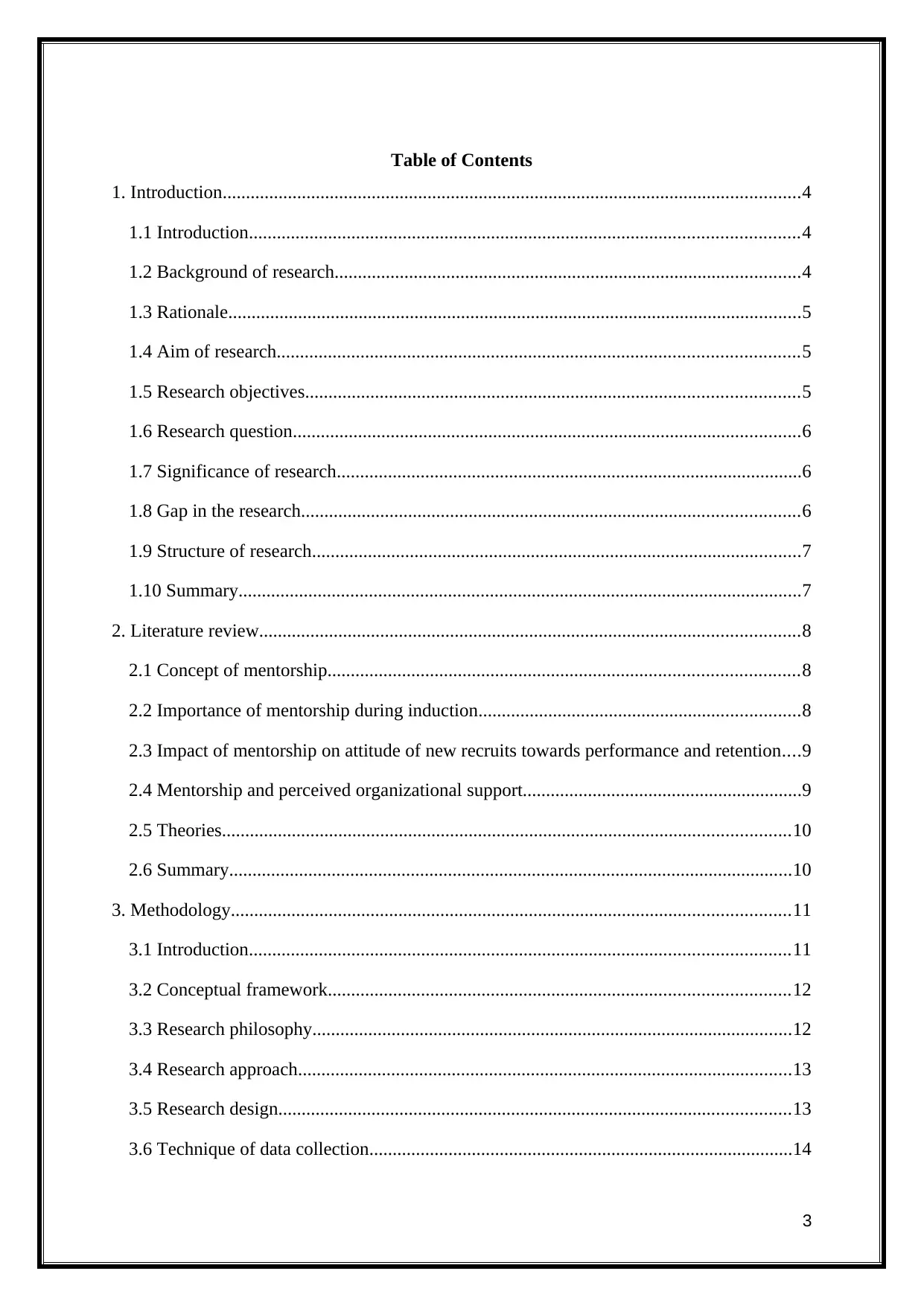
Table of Contents
1. Introduction............................................................................................................................4
1.1 Introduction......................................................................................................................4
1.2 Background of research....................................................................................................4
1.3 Rationale...........................................................................................................................5
1.4 Aim of research................................................................................................................5
1.5 Research objectives..........................................................................................................5
1.6 Research question.............................................................................................................6
1.7 Significance of research....................................................................................................6
1.8 Gap in the research...........................................................................................................6
1.9 Structure of research.........................................................................................................7
1.10 Summary.........................................................................................................................7
2. Literature review....................................................................................................................8
2.1 Concept of mentorship.....................................................................................................8
2.2 Importance of mentorship during induction.....................................................................8
2.3 Impact of mentorship on attitude of new recruits towards performance and retention....9
2.4 Mentorship and perceived organizational support............................................................9
2.5 Theories..........................................................................................................................10
2.6 Summary.........................................................................................................................10
3. Methodology........................................................................................................................11
3.1 Introduction....................................................................................................................11
3.2 Conceptual framework...................................................................................................12
3.3 Research philosophy.......................................................................................................12
3.4 Research approach..........................................................................................................13
3.5 Research design..............................................................................................................13
3.6 Technique of data collection...........................................................................................14
3
1. Introduction............................................................................................................................4
1.1 Introduction......................................................................................................................4
1.2 Background of research....................................................................................................4
1.3 Rationale...........................................................................................................................5
1.4 Aim of research................................................................................................................5
1.5 Research objectives..........................................................................................................5
1.6 Research question.............................................................................................................6
1.7 Significance of research....................................................................................................6
1.8 Gap in the research...........................................................................................................6
1.9 Structure of research.........................................................................................................7
1.10 Summary.........................................................................................................................7
2. Literature review....................................................................................................................8
2.1 Concept of mentorship.....................................................................................................8
2.2 Importance of mentorship during induction.....................................................................8
2.3 Impact of mentorship on attitude of new recruits towards performance and retention....9
2.4 Mentorship and perceived organizational support............................................................9
2.5 Theories..........................................................................................................................10
2.6 Summary.........................................................................................................................10
3. Methodology........................................................................................................................11
3.1 Introduction....................................................................................................................11
3.2 Conceptual framework...................................................................................................12
3.3 Research philosophy.......................................................................................................12
3.4 Research approach..........................................................................................................13
3.5 Research design..............................................................................................................13
3.6 Technique of data collection...........................................................................................14
3
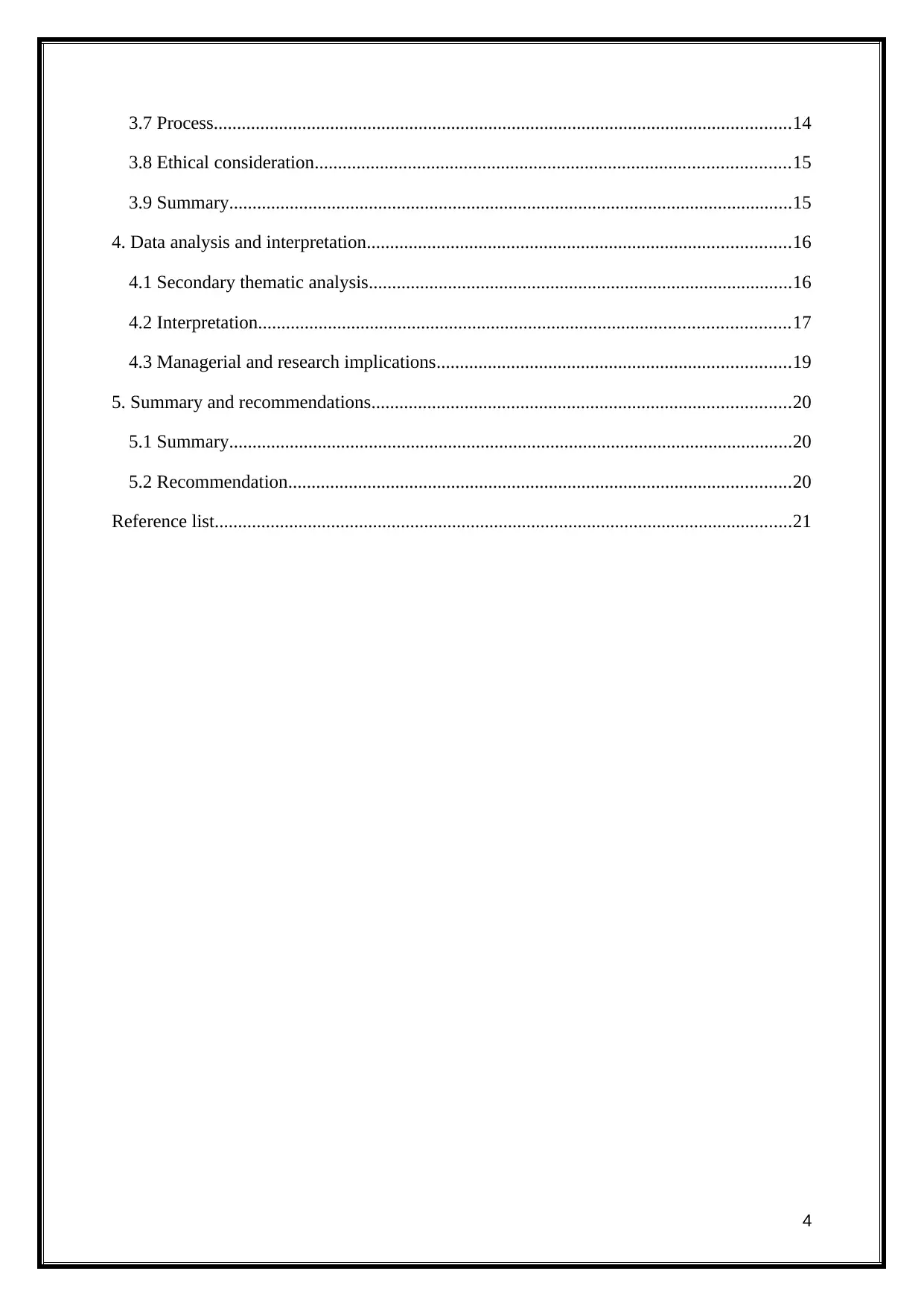
3.7 Process............................................................................................................................14
3.8 Ethical consideration......................................................................................................15
3.9 Summary.........................................................................................................................15
4. Data analysis and interpretation...........................................................................................16
4.1 Secondary thematic analysis...........................................................................................16
4.2 Interpretation..................................................................................................................17
4.3 Managerial and research implications............................................................................19
5. Summary and recommendations..........................................................................................20
5.1 Summary.........................................................................................................................20
5.2 Recommendation............................................................................................................20
Reference list............................................................................................................................21
4
3.8 Ethical consideration......................................................................................................15
3.9 Summary.........................................................................................................................15
4. Data analysis and interpretation...........................................................................................16
4.1 Secondary thematic analysis...........................................................................................16
4.2 Interpretation..................................................................................................................17
4.3 Managerial and research implications............................................................................19
5. Summary and recommendations..........................................................................................20
5.1 Summary.........................................................................................................................20
5.2 Recommendation............................................................................................................20
Reference list............................................................................................................................21
4
Secure Best Marks with AI Grader
Need help grading? Try our AI Grader for instant feedback on your assignments.
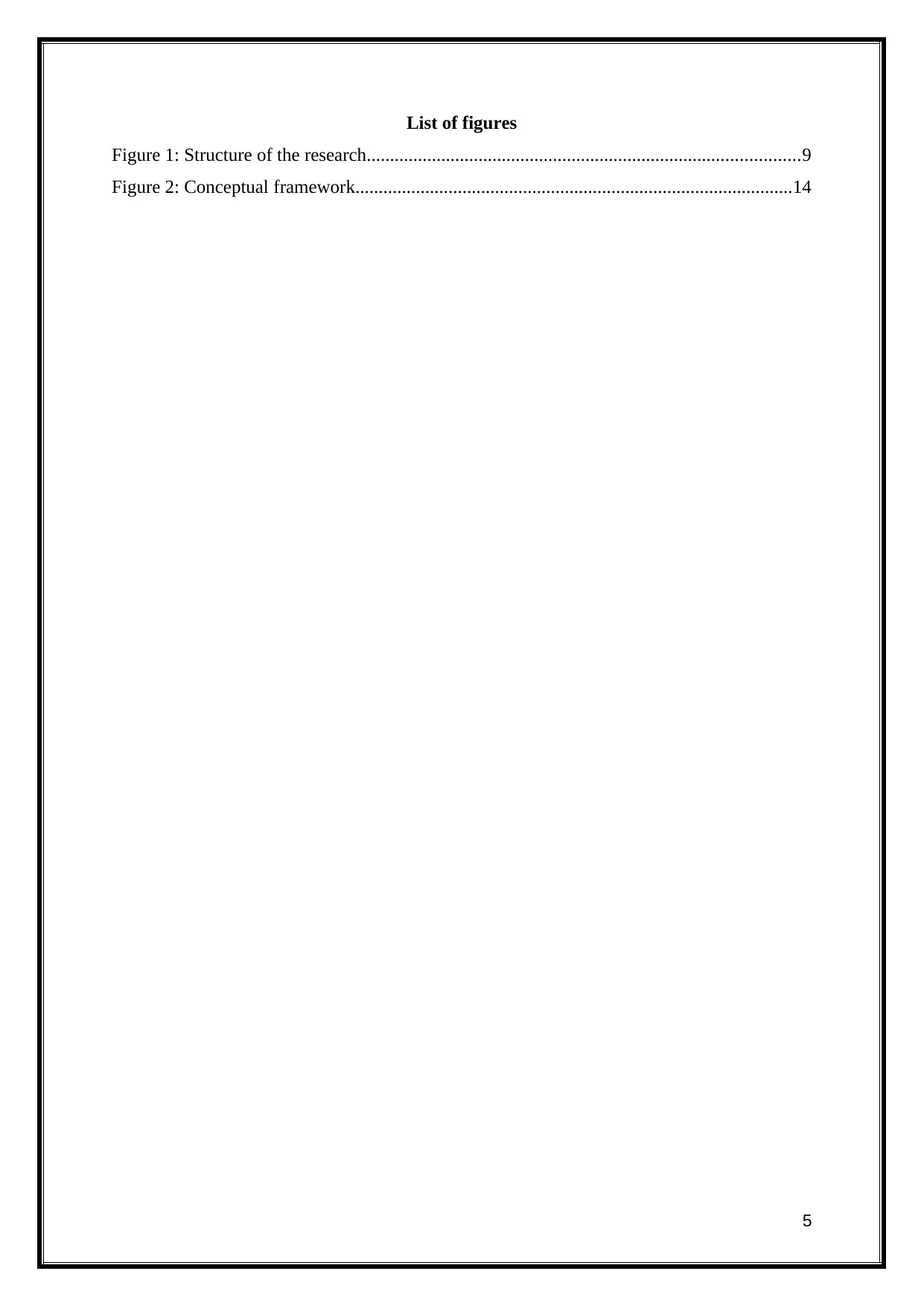
List of figures
Figure 1: Structure of the research.............................................................................................9
Figure 2: Conceptual framework..............................................................................................14
5
Figure 1: Structure of the research.............................................................................................9
Figure 2: Conceptual framework..............................................................................................14
5
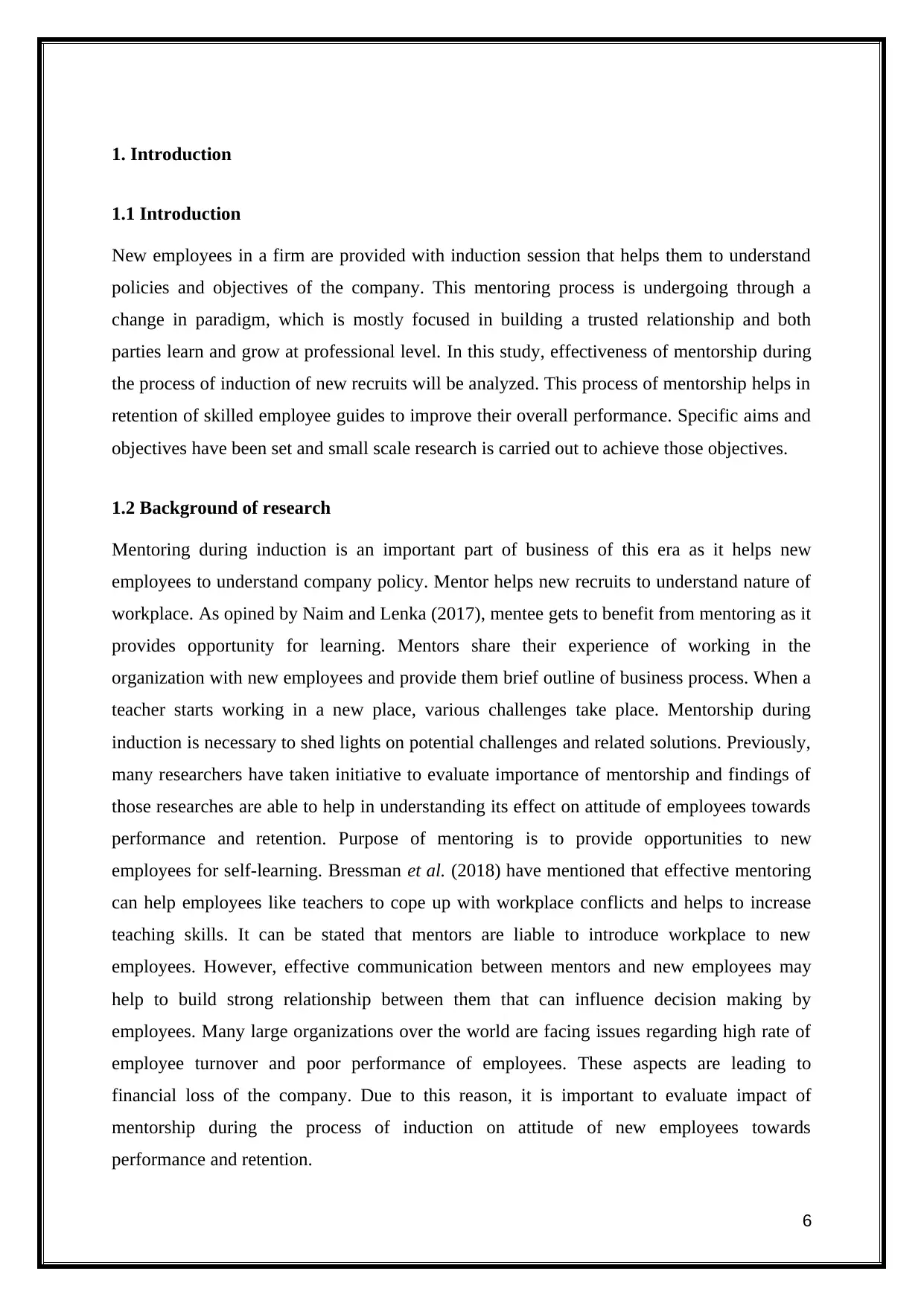
1. Introduction
1.1 Introduction
New employees in a firm are provided with induction session that helps them to understand
policies and objectives of the company. This mentoring process is undergoing through a
change in paradigm, which is mostly focused in building a trusted relationship and both
parties learn and grow at professional level. In this study, effectiveness of mentorship during
the process of induction of new recruits will be analyzed. This process of mentorship helps in
retention of skilled employee guides to improve their overall performance. Specific aims and
objectives have been set and small scale research is carried out to achieve those objectives.
1.2 Background of research
Mentoring during induction is an important part of business of this era as it helps new
employees to understand company policy. Mentor helps new recruits to understand nature of
workplace. As opined by Naim and Lenka (2017), mentee gets to benefit from mentoring as it
provides opportunity for learning. Mentors share their experience of working in the
organization with new employees and provide them brief outline of business process. When a
teacher starts working in a new place, various challenges take place. Mentorship during
induction is necessary to shed lights on potential challenges and related solutions. Previously,
many researchers have taken initiative to evaluate importance of mentorship and findings of
those researches are able to help in understanding its effect on attitude of employees towards
performance and retention. Purpose of mentoring is to provide opportunities to new
employees for self-learning. Bressman et al. (2018) have mentioned that effective mentoring
can help employees like teachers to cope up with workplace conflicts and helps to increase
teaching skills. It can be stated that mentors are liable to introduce workplace to new
employees. However, effective communication between mentors and new employees may
help to build strong relationship between them that can influence decision making by
employees. Many large organizations over the world are facing issues regarding high rate of
employee turnover and poor performance of employees. These aspects are leading to
financial loss of the company. Due to this reason, it is important to evaluate impact of
mentorship during the process of induction on attitude of new employees towards
performance and retention.
6
1.1 Introduction
New employees in a firm are provided with induction session that helps them to understand
policies and objectives of the company. This mentoring process is undergoing through a
change in paradigm, which is mostly focused in building a trusted relationship and both
parties learn and grow at professional level. In this study, effectiveness of mentorship during
the process of induction of new recruits will be analyzed. This process of mentorship helps in
retention of skilled employee guides to improve their overall performance. Specific aims and
objectives have been set and small scale research is carried out to achieve those objectives.
1.2 Background of research
Mentoring during induction is an important part of business of this era as it helps new
employees to understand company policy. Mentor helps new recruits to understand nature of
workplace. As opined by Naim and Lenka (2017), mentee gets to benefit from mentoring as it
provides opportunity for learning. Mentors share their experience of working in the
organization with new employees and provide them brief outline of business process. When a
teacher starts working in a new place, various challenges take place. Mentorship during
induction is necessary to shed lights on potential challenges and related solutions. Previously,
many researchers have taken initiative to evaluate importance of mentorship and findings of
those researches are able to help in understanding its effect on attitude of employees towards
performance and retention. Purpose of mentoring is to provide opportunities to new
employees for self-learning. Bressman et al. (2018) have mentioned that effective mentoring
can help employees like teachers to cope up with workplace conflicts and helps to increase
teaching skills. It can be stated that mentors are liable to introduce workplace to new
employees. However, effective communication between mentors and new employees may
help to build strong relationship between them that can influence decision making by
employees. Many large organizations over the world are facing issues regarding high rate of
employee turnover and poor performance of employees. These aspects are leading to
financial loss of the company. Due to this reason, it is important to evaluate impact of
mentorship during the process of induction on attitude of new employees towards
performance and retention.
6
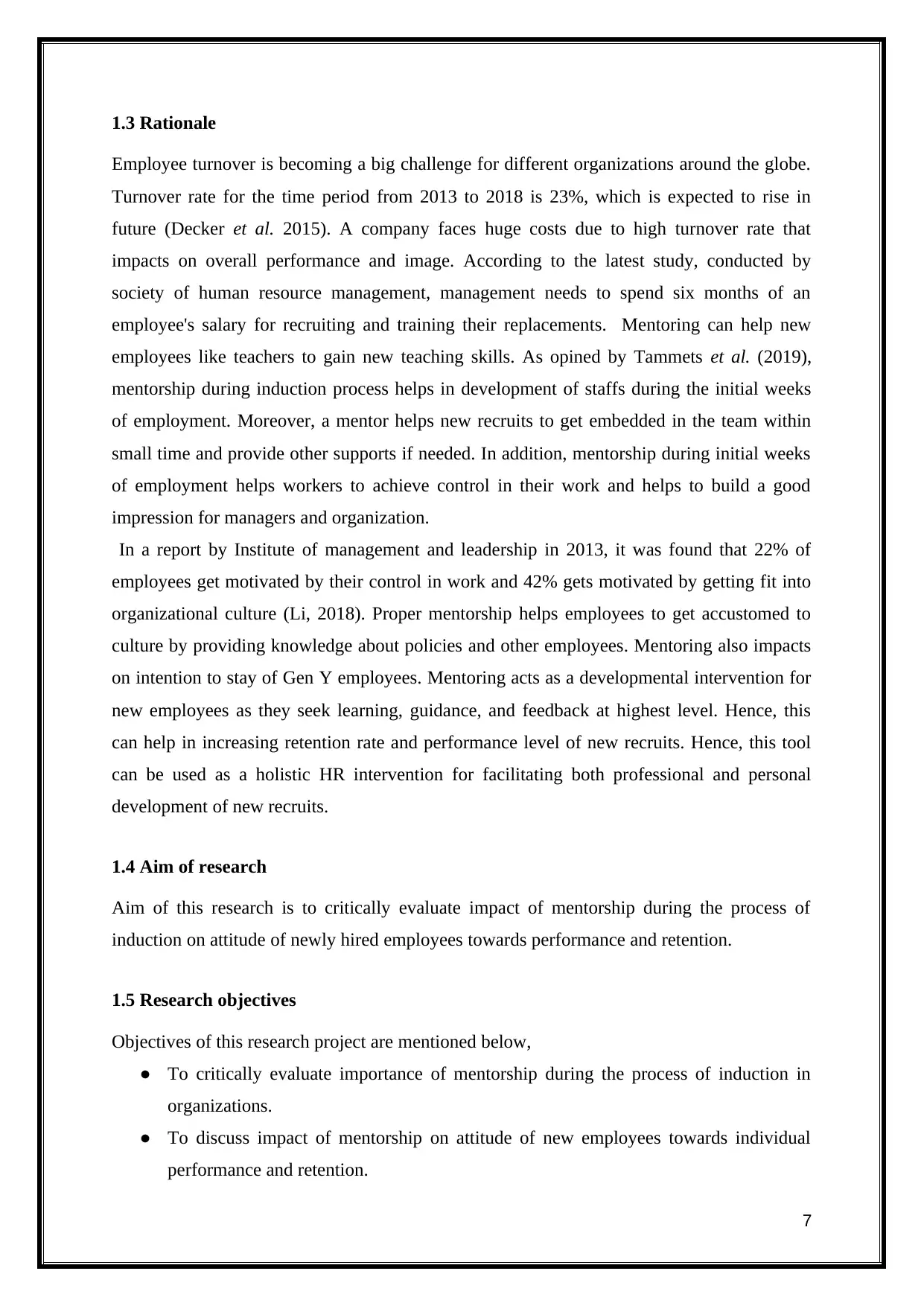
1.3 Rationale
Employee turnover is becoming a big challenge for different organizations around the globe.
Turnover rate for the time period from 2013 to 2018 is 23%, which is expected to rise in
future (Decker et al. 2015). A company faces huge costs due to high turnover rate that
impacts on overall performance and image. According to the latest study, conducted by
society of human resource management, management needs to spend six months of an
employee's salary for recruiting and training their replacements. Mentoring can help new
employees like teachers to gain new teaching skills. As opined by Tammets et al. (2019),
mentorship during induction process helps in development of staffs during the initial weeks
of employment. Moreover, a mentor helps new recruits to get embedded in the team within
small time and provide other supports if needed. In addition, mentorship during initial weeks
of employment helps workers to achieve control in their work and helps to build a good
impression for managers and organization.
In a report by Institute of management and leadership in 2013, it was found that 22% of
employees get motivated by their control in work and 42% gets motivated by getting fit into
organizational culture (Li, 2018). Proper mentorship helps employees to get accustomed to
culture by providing knowledge about policies and other employees. Mentoring also impacts
on intention to stay of Gen Y employees. Mentoring acts as a developmental intervention for
new employees as they seek learning, guidance, and feedback at highest level. Hence, this
can help in increasing retention rate and performance level of new recruits. Hence, this tool
can be used as a holistic HR intervention for facilitating both professional and personal
development of new recruits.
1.4 Aim of research
Aim of this research is to critically evaluate impact of mentorship during the process of
induction on attitude of newly hired employees towards performance and retention.
1.5 Research objectives
Objectives of this research project are mentioned below,
● To critically evaluate importance of mentorship during the process of induction in
organizations.
● To discuss impact of mentorship on attitude of new employees towards individual
performance and retention.
7
Employee turnover is becoming a big challenge for different organizations around the globe.
Turnover rate for the time period from 2013 to 2018 is 23%, which is expected to rise in
future (Decker et al. 2015). A company faces huge costs due to high turnover rate that
impacts on overall performance and image. According to the latest study, conducted by
society of human resource management, management needs to spend six months of an
employee's salary for recruiting and training their replacements. Mentoring can help new
employees like teachers to gain new teaching skills. As opined by Tammets et al. (2019),
mentorship during induction process helps in development of staffs during the initial weeks
of employment. Moreover, a mentor helps new recruits to get embedded in the team within
small time and provide other supports if needed. In addition, mentorship during initial weeks
of employment helps workers to achieve control in their work and helps to build a good
impression for managers and organization.
In a report by Institute of management and leadership in 2013, it was found that 22% of
employees get motivated by their control in work and 42% gets motivated by getting fit into
organizational culture (Li, 2018). Proper mentorship helps employees to get accustomed to
culture by providing knowledge about policies and other employees. Mentoring also impacts
on intention to stay of Gen Y employees. Mentoring acts as a developmental intervention for
new employees as they seek learning, guidance, and feedback at highest level. Hence, this
can help in increasing retention rate and performance level of new recruits. Hence, this tool
can be used as a holistic HR intervention for facilitating both professional and personal
development of new recruits.
1.4 Aim of research
Aim of this research is to critically evaluate impact of mentorship during the process of
induction on attitude of newly hired employees towards performance and retention.
1.5 Research objectives
Objectives of this research project are mentioned below,
● To critically evaluate importance of mentorship during the process of induction in
organizations.
● To discuss impact of mentorship on attitude of new employees towards individual
performance and retention.
7
Paraphrase This Document
Need a fresh take? Get an instant paraphrase of this document with our AI Paraphraser
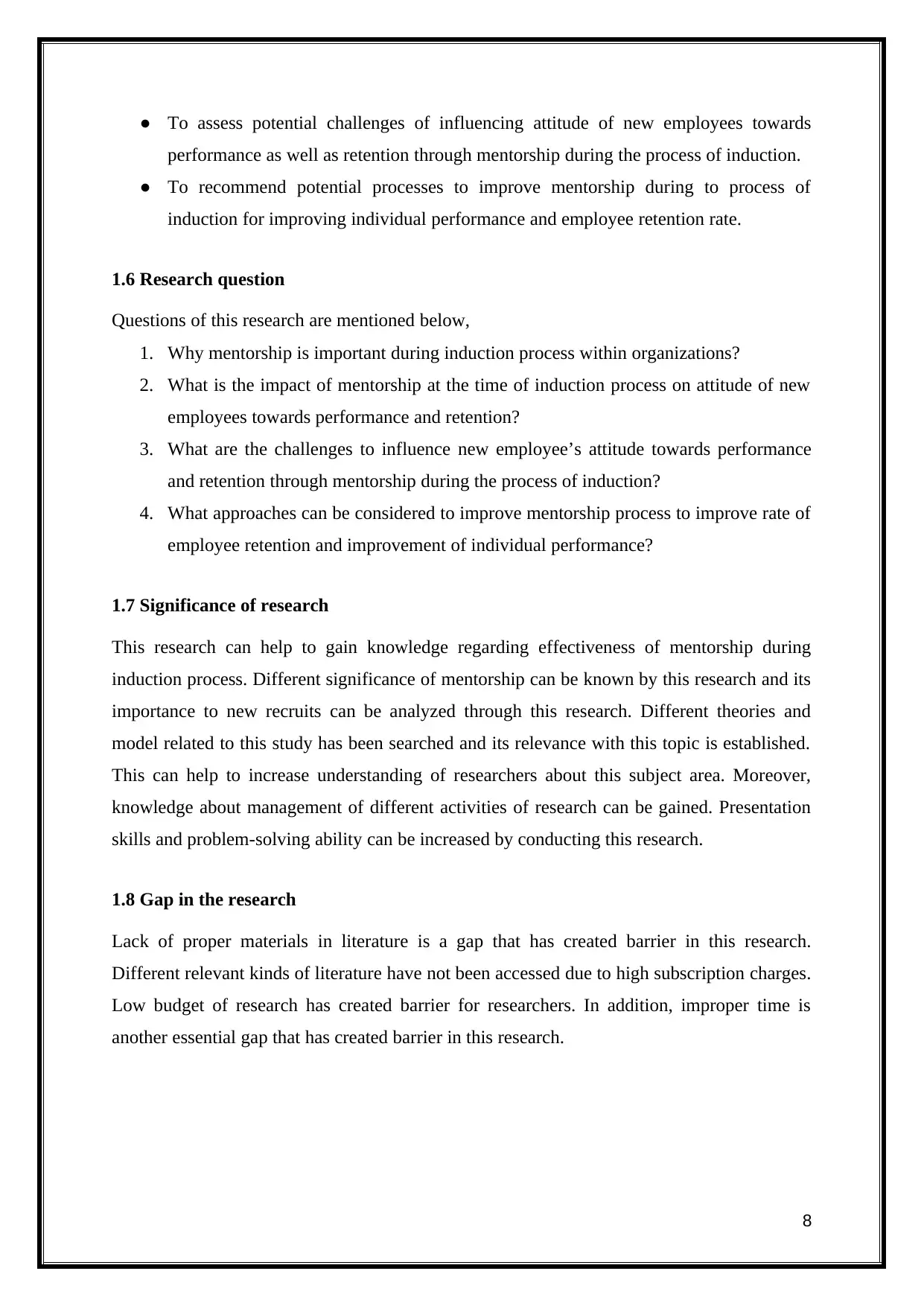
● To assess potential challenges of influencing attitude of new employees towards
performance as well as retention through mentorship during the process of induction.
● To recommend potential processes to improve mentorship during to process of
induction for improving individual performance and employee retention rate.
1.6 Research question
Questions of this research are mentioned below,
1. Why mentorship is important during induction process within organizations?
2. What is the impact of mentorship at the time of induction process on attitude of new
employees towards performance and retention?
3. What are the challenges to influence new employee’s attitude towards performance
and retention through mentorship during the process of induction?
4. What approaches can be considered to improve mentorship process to improve rate of
employee retention and improvement of individual performance?
1.7 Significance of research
This research can help to gain knowledge regarding effectiveness of mentorship during
induction process. Different significance of mentorship can be known by this research and its
importance to new recruits can be analyzed through this research. Different theories and
model related to this study has been searched and its relevance with this topic is established.
This can help to increase understanding of researchers about this subject area. Moreover,
knowledge about management of different activities of research can be gained. Presentation
skills and problem-solving ability can be increased by conducting this research.
1.8 Gap in the research
Lack of proper materials in literature is a gap that has created barrier in this research.
Different relevant kinds of literature have not been accessed due to high subscription charges.
Low budget of research has created barrier for researchers. In addition, improper time is
another essential gap that has created barrier in this research.
8
performance as well as retention through mentorship during the process of induction.
● To recommend potential processes to improve mentorship during to process of
induction for improving individual performance and employee retention rate.
1.6 Research question
Questions of this research are mentioned below,
1. Why mentorship is important during induction process within organizations?
2. What is the impact of mentorship at the time of induction process on attitude of new
employees towards performance and retention?
3. What are the challenges to influence new employee’s attitude towards performance
and retention through mentorship during the process of induction?
4. What approaches can be considered to improve mentorship process to improve rate of
employee retention and improvement of individual performance?
1.7 Significance of research
This research can help to gain knowledge regarding effectiveness of mentorship during
induction process. Different significance of mentorship can be known by this research and its
importance to new recruits can be analyzed through this research. Different theories and
model related to this study has been searched and its relevance with this topic is established.
This can help to increase understanding of researchers about this subject area. Moreover,
knowledge about management of different activities of research can be gained. Presentation
skills and problem-solving ability can be increased by conducting this research.
1.8 Gap in the research
Lack of proper materials in literature is a gap that has created barrier in this research.
Different relevant kinds of literature have not been accessed due to high subscription charges.
Low budget of research has created barrier for researchers. In addition, improper time is
another essential gap that has created barrier in this research.
8
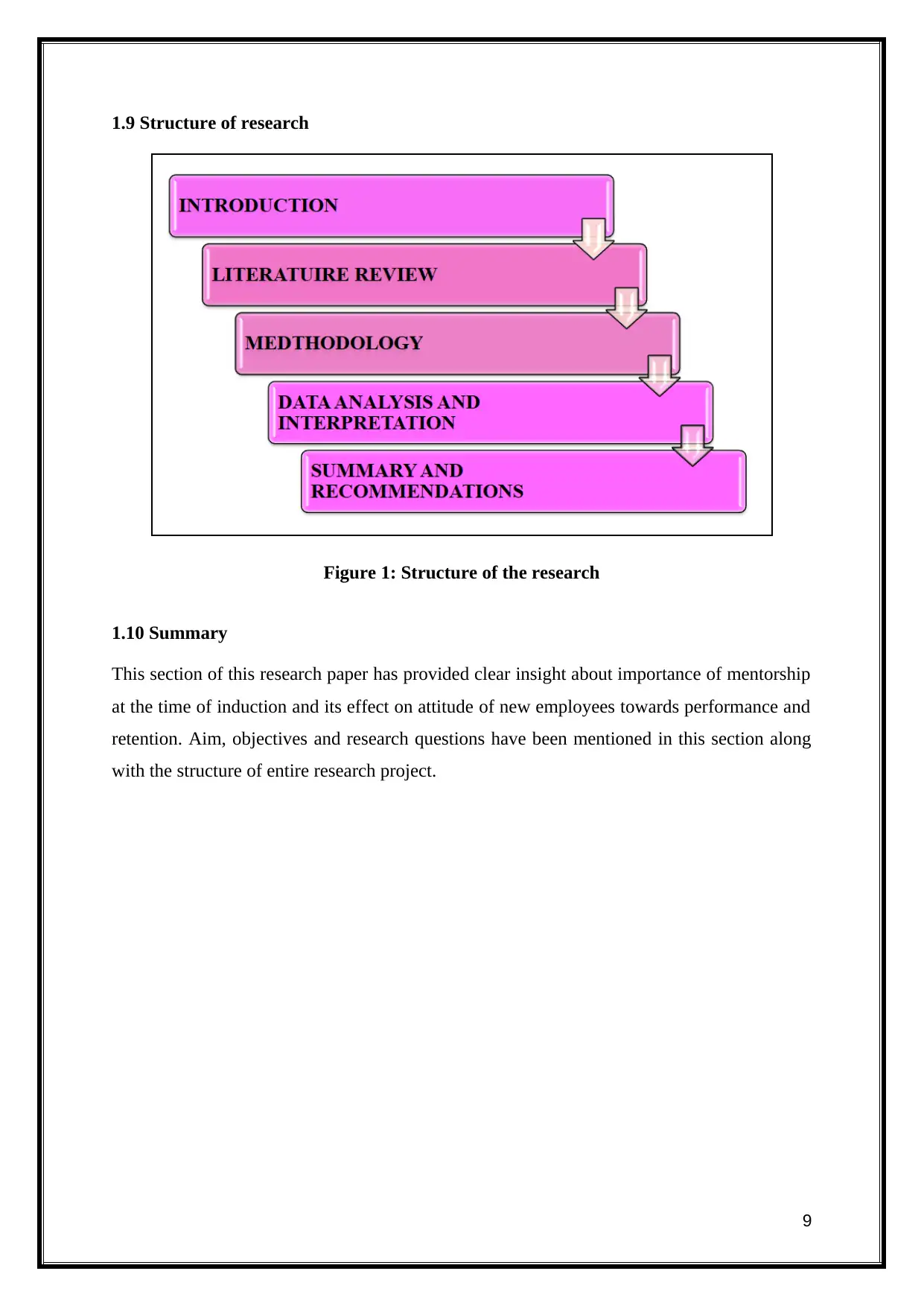
1.9 Structure of research
Figure 1: Structure of the research
1.10 Summary
This section of this research paper has provided clear insight about importance of mentorship
at the time of induction and its effect on attitude of new employees towards performance and
retention. Aim, objectives and research questions have been mentioned in this section along
with the structure of entire research project.
9
Figure 1: Structure of the research
1.10 Summary
This section of this research paper has provided clear insight about importance of mentorship
at the time of induction and its effect on attitude of new employees towards performance and
retention. Aim, objectives and research questions have been mentioned in this section along
with the structure of entire research project.
9
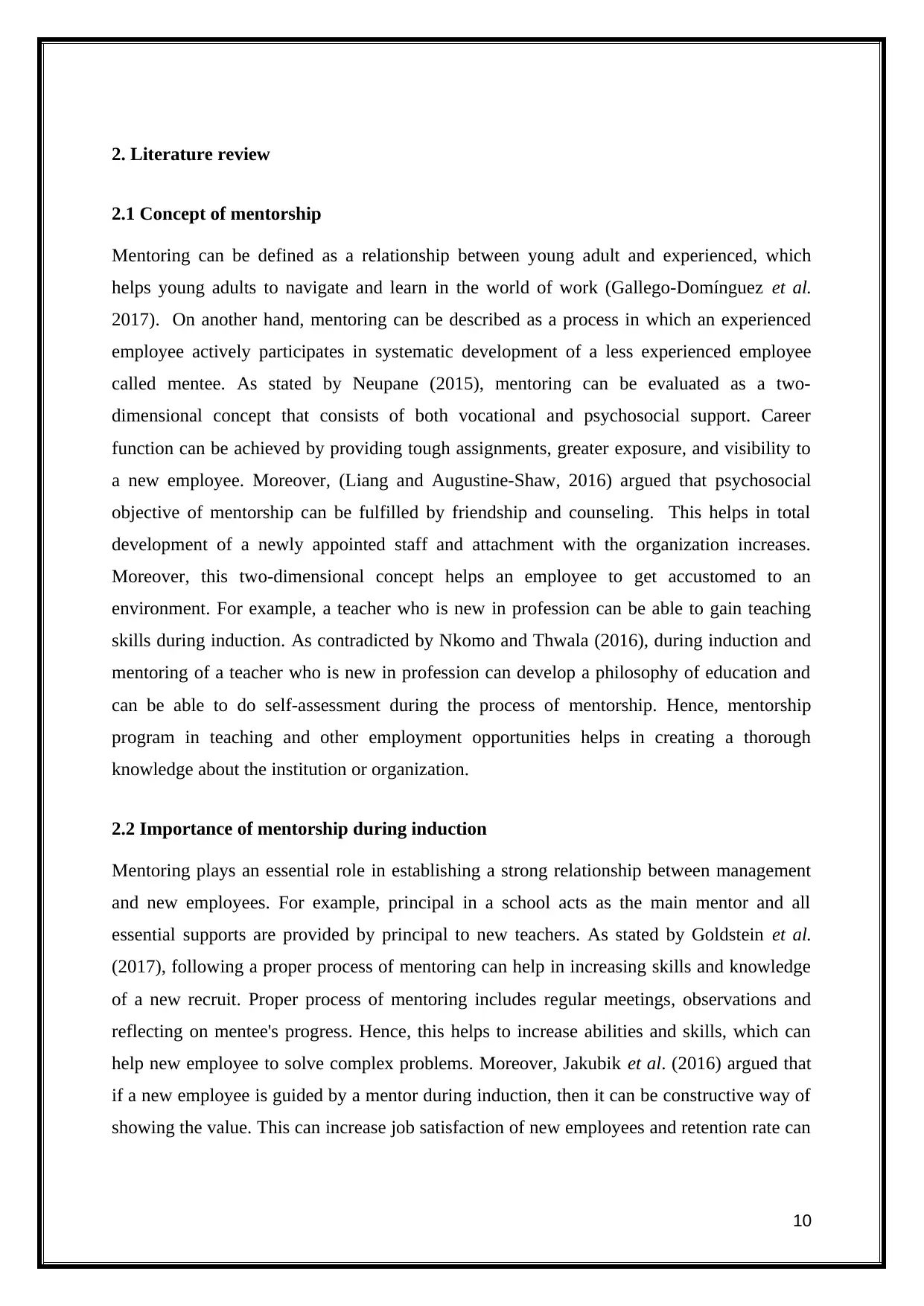
2. Literature review
2.1 Concept of mentorship
Mentoring can be defined as a relationship between young adult and experienced, which
helps young adults to navigate and learn in the world of work (Gallego-Domínguez et al.
2017). On another hand, mentoring can be described as a process in which an experienced
employee actively participates in systematic development of a less experienced employee
called mentee. As stated by Neupane (2015), mentoring can be evaluated as a two-
dimensional concept that consists of both vocational and psychosocial support. Career
function can be achieved by providing tough assignments, greater exposure, and visibility to
a new employee. Moreover, (Liang and Augustine-Shaw, 2016) argued that psychosocial
objective of mentorship can be fulfilled by friendship and counseling. This helps in total
development of a newly appointed staff and attachment with the organization increases.
Moreover, this two-dimensional concept helps an employee to get accustomed to an
environment. For example, a teacher who is new in profession can be able to gain teaching
skills during induction. As contradicted by Nkomo and Thwala (2016), during induction and
mentoring of a teacher who is new in profession can develop a philosophy of education and
can be able to do self-assessment during the process of mentorship. Hence, mentorship
program in teaching and other employment opportunities helps in creating a thorough
knowledge about the institution or organization.
2.2 Importance of mentorship during induction
Mentoring plays an essential role in establishing a strong relationship between management
and new employees. For example, principal in a school acts as the main mentor and all
essential supports are provided by principal to new teachers. As stated by Goldstein et al.
(2017), following a proper process of mentoring can help in increasing skills and knowledge
of a new recruit. Proper process of mentoring includes regular meetings, observations and
reflecting on mentee's progress. Hence, this helps to increase abilities and skills, which can
help new employee to solve complex problems. Moreover, Jakubik et al. (2016) argued that
if a new employee is guided by a mentor during induction, then it can be constructive way of
showing the value. This can increase job satisfaction of new employees and retention rate can
10
2.1 Concept of mentorship
Mentoring can be defined as a relationship between young adult and experienced, which
helps young adults to navigate and learn in the world of work (Gallego-Domínguez et al.
2017). On another hand, mentoring can be described as a process in which an experienced
employee actively participates in systematic development of a less experienced employee
called mentee. As stated by Neupane (2015), mentoring can be evaluated as a two-
dimensional concept that consists of both vocational and psychosocial support. Career
function can be achieved by providing tough assignments, greater exposure, and visibility to
a new employee. Moreover, (Liang and Augustine-Shaw, 2016) argued that psychosocial
objective of mentorship can be fulfilled by friendship and counseling. This helps in total
development of a newly appointed staff and attachment with the organization increases.
Moreover, this two-dimensional concept helps an employee to get accustomed to an
environment. For example, a teacher who is new in profession can be able to gain teaching
skills during induction. As contradicted by Nkomo and Thwala (2016), during induction and
mentoring of a teacher who is new in profession can develop a philosophy of education and
can be able to do self-assessment during the process of mentorship. Hence, mentorship
program in teaching and other employment opportunities helps in creating a thorough
knowledge about the institution or organization.
2.2 Importance of mentorship during induction
Mentoring plays an essential role in establishing a strong relationship between management
and new employees. For example, principal in a school acts as the main mentor and all
essential supports are provided by principal to new teachers. As stated by Goldstein et al.
(2017), following a proper process of mentoring can help in increasing skills and knowledge
of a new recruit. Proper process of mentoring includes regular meetings, observations and
reflecting on mentee's progress. Hence, this helps to increase abilities and skills, which can
help new employee to solve complex problems. Moreover, Jakubik et al. (2016) argued that
if a new employee is guided by a mentor during induction, then it can be constructive way of
showing the value. This can increase job satisfaction of new employees and retention rate can
10
Secure Best Marks with AI Grader
Need help grading? Try our AI Grader for instant feedback on your assignments.
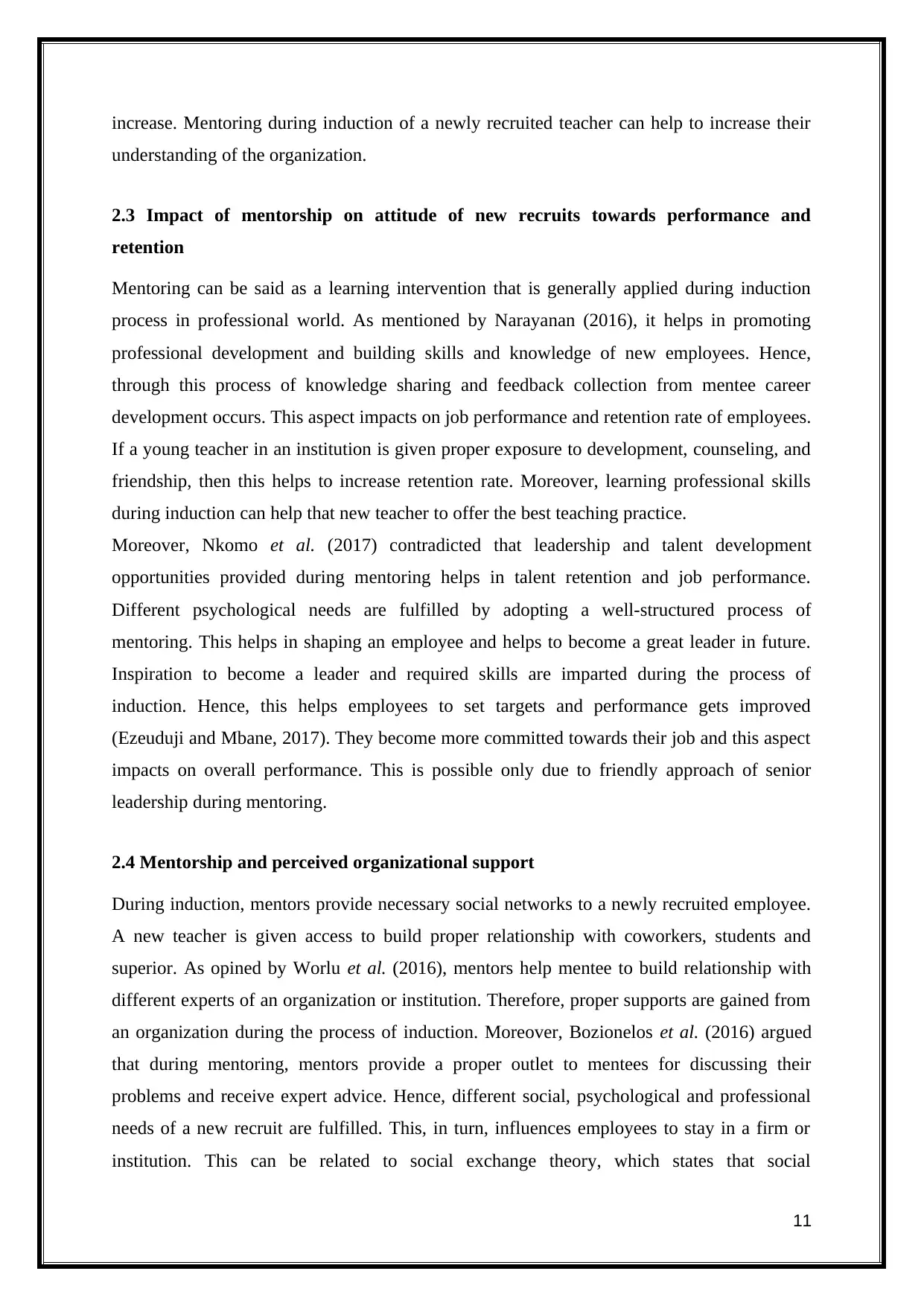
increase. Mentoring during induction of a newly recruited teacher can help to increase their
understanding of the organization.
2.3 Impact of mentorship on attitude of new recruits towards performance and
retention
Mentoring can be said as a learning intervention that is generally applied during induction
process in professional world. As mentioned by Narayanan (2016), it helps in promoting
professional development and building skills and knowledge of new employees. Hence,
through this process of knowledge sharing and feedback collection from mentee career
development occurs. This aspect impacts on job performance and retention rate of employees.
If a young teacher in an institution is given proper exposure to development, counseling, and
friendship, then this helps to increase retention rate. Moreover, learning professional skills
during induction can help that new teacher to offer the best teaching practice.
Moreover, Nkomo et al. (2017) contradicted that leadership and talent development
opportunities provided during mentoring helps in talent retention and job performance.
Different psychological needs are fulfilled by adopting a well-structured process of
mentoring. This helps in shaping an employee and helps to become a great leader in future.
Inspiration to become a leader and required skills are imparted during the process of
induction. Hence, this helps employees to set targets and performance gets improved
(Ezeuduji and Mbane, 2017). They become more committed towards their job and this aspect
impacts on overall performance. This is possible only due to friendly approach of senior
leadership during mentoring.
2.4 Mentorship and perceived organizational support
During induction, mentors provide necessary social networks to a newly recruited employee.
A new teacher is given access to build proper relationship with coworkers, students and
superior. As opined by Worlu et al. (2016), mentors help mentee to build relationship with
different experts of an organization or institution. Therefore, proper supports are gained from
an organization during the process of induction. Moreover, Bozionelos et al. (2016) argued
that during mentoring, mentors provide a proper outlet to mentees for discussing their
problems and receive expert advice. Hence, different social, psychological and professional
needs of a new recruit are fulfilled. This, in turn, influences employees to stay in a firm or
institution. This can be related to social exchange theory, which states that social
11
understanding of the organization.
2.3 Impact of mentorship on attitude of new recruits towards performance and
retention
Mentoring can be said as a learning intervention that is generally applied during induction
process in professional world. As mentioned by Narayanan (2016), it helps in promoting
professional development and building skills and knowledge of new employees. Hence,
through this process of knowledge sharing and feedback collection from mentee career
development occurs. This aspect impacts on job performance and retention rate of employees.
If a young teacher in an institution is given proper exposure to development, counseling, and
friendship, then this helps to increase retention rate. Moreover, learning professional skills
during induction can help that new teacher to offer the best teaching practice.
Moreover, Nkomo et al. (2017) contradicted that leadership and talent development
opportunities provided during mentoring helps in talent retention and job performance.
Different psychological needs are fulfilled by adopting a well-structured process of
mentoring. This helps in shaping an employee and helps to become a great leader in future.
Inspiration to become a leader and required skills are imparted during the process of
induction. Hence, this helps employees to set targets and performance gets improved
(Ezeuduji and Mbane, 2017). They become more committed towards their job and this aspect
impacts on overall performance. This is possible only due to friendly approach of senior
leadership during mentoring.
2.4 Mentorship and perceived organizational support
During induction, mentors provide necessary social networks to a newly recruited employee.
A new teacher is given access to build proper relationship with coworkers, students and
superior. As opined by Worlu et al. (2016), mentors help mentee to build relationship with
different experts of an organization or institution. Therefore, proper supports are gained from
an organization during the process of induction. Moreover, Bozionelos et al. (2016) argued
that during mentoring, mentors provide a proper outlet to mentees for discussing their
problems and receive expert advice. Hence, different social, psychological and professional
needs of a new recruit are fulfilled. This, in turn, influences employees to stay in a firm or
institution. This can be related to social exchange theory, which states that social
11
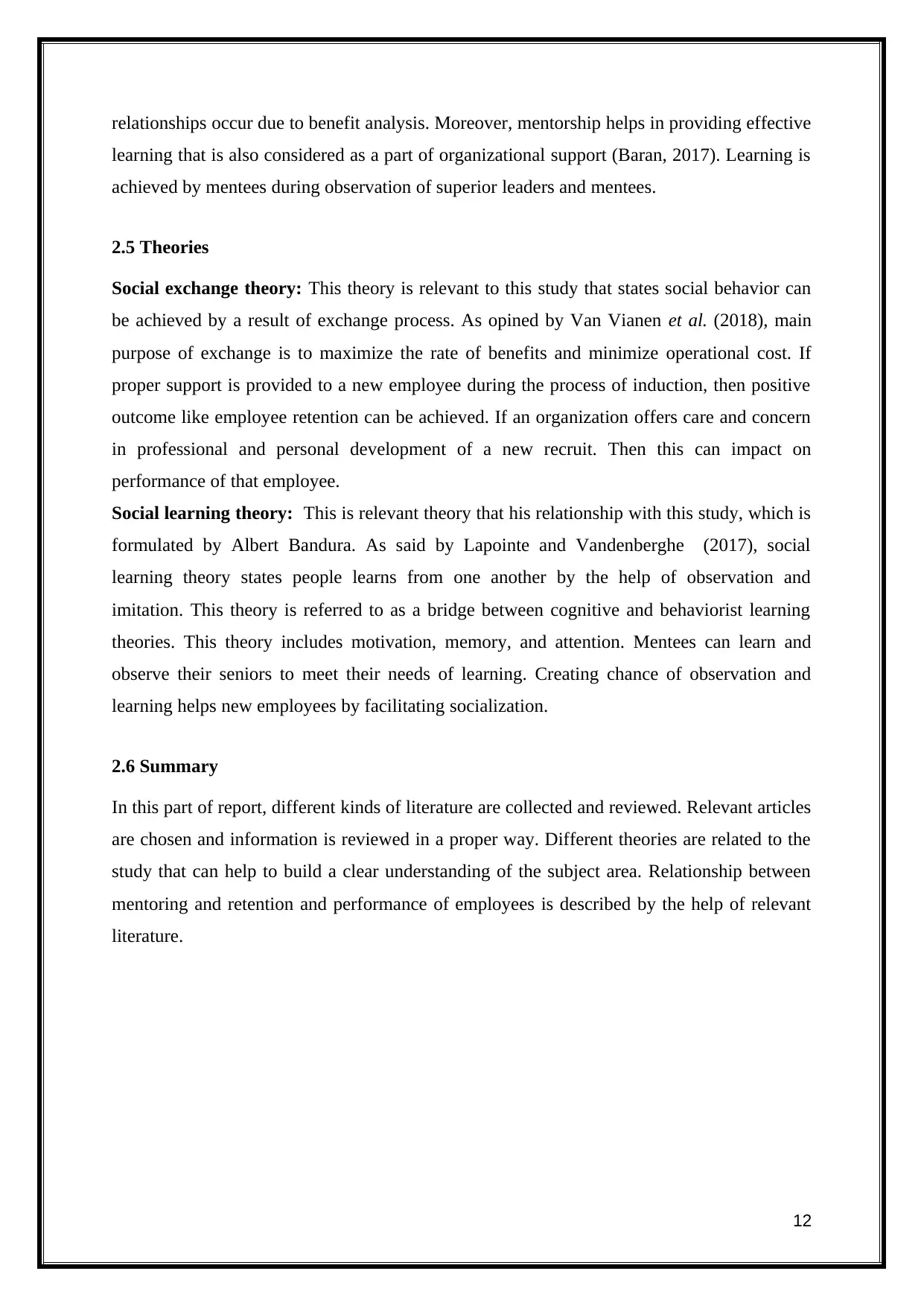
relationships occur due to benefit analysis. Moreover, mentorship helps in providing effective
learning that is also considered as a part of organizational support (Baran, 2017). Learning is
achieved by mentees during observation of superior leaders and mentees.
2.5 Theories
Social exchange theory: This theory is relevant to this study that states social behavior can
be achieved by a result of exchange process. As opined by Van Vianen et al. (2018), main
purpose of exchange is to maximize the rate of benefits and minimize operational cost. If
proper support is provided to a new employee during the process of induction, then positive
outcome like employee retention can be achieved. If an organization offers care and concern
in professional and personal development of a new recruit. Then this can impact on
performance of that employee.
Social learning theory: This is relevant theory that his relationship with this study, which is
formulated by Albert Bandura. As said by Lapointe and Vandenberghe (2017), social
learning theory states people learns from one another by the help of observation and
imitation. This theory is referred to as a bridge between cognitive and behaviorist learning
theories. This theory includes motivation, memory, and attention. Mentees can learn and
observe their seniors to meet their needs of learning. Creating chance of observation and
learning helps new employees by facilitating socialization.
2.6 Summary
In this part of report, different kinds of literature are collected and reviewed. Relevant articles
are chosen and information is reviewed in a proper way. Different theories are related to the
study that can help to build a clear understanding of the subject area. Relationship between
mentoring and retention and performance of employees is described by the help of relevant
literature.
12
learning that is also considered as a part of organizational support (Baran, 2017). Learning is
achieved by mentees during observation of superior leaders and mentees.
2.5 Theories
Social exchange theory: This theory is relevant to this study that states social behavior can
be achieved by a result of exchange process. As opined by Van Vianen et al. (2018), main
purpose of exchange is to maximize the rate of benefits and minimize operational cost. If
proper support is provided to a new employee during the process of induction, then positive
outcome like employee retention can be achieved. If an organization offers care and concern
in professional and personal development of a new recruit. Then this can impact on
performance of that employee.
Social learning theory: This is relevant theory that his relationship with this study, which is
formulated by Albert Bandura. As said by Lapointe and Vandenberghe (2017), social
learning theory states people learns from one another by the help of observation and
imitation. This theory is referred to as a bridge between cognitive and behaviorist learning
theories. This theory includes motivation, memory, and attention. Mentees can learn and
observe their seniors to meet their needs of learning. Creating chance of observation and
learning helps new employees by facilitating socialization.
2.6 Summary
In this part of report, different kinds of literature are collected and reviewed. Relevant articles
are chosen and information is reviewed in a proper way. Different theories are related to the
study that can help to build a clear understanding of the subject area. Relationship between
mentoring and retention and performance of employees is described by the help of relevant
literature.
12
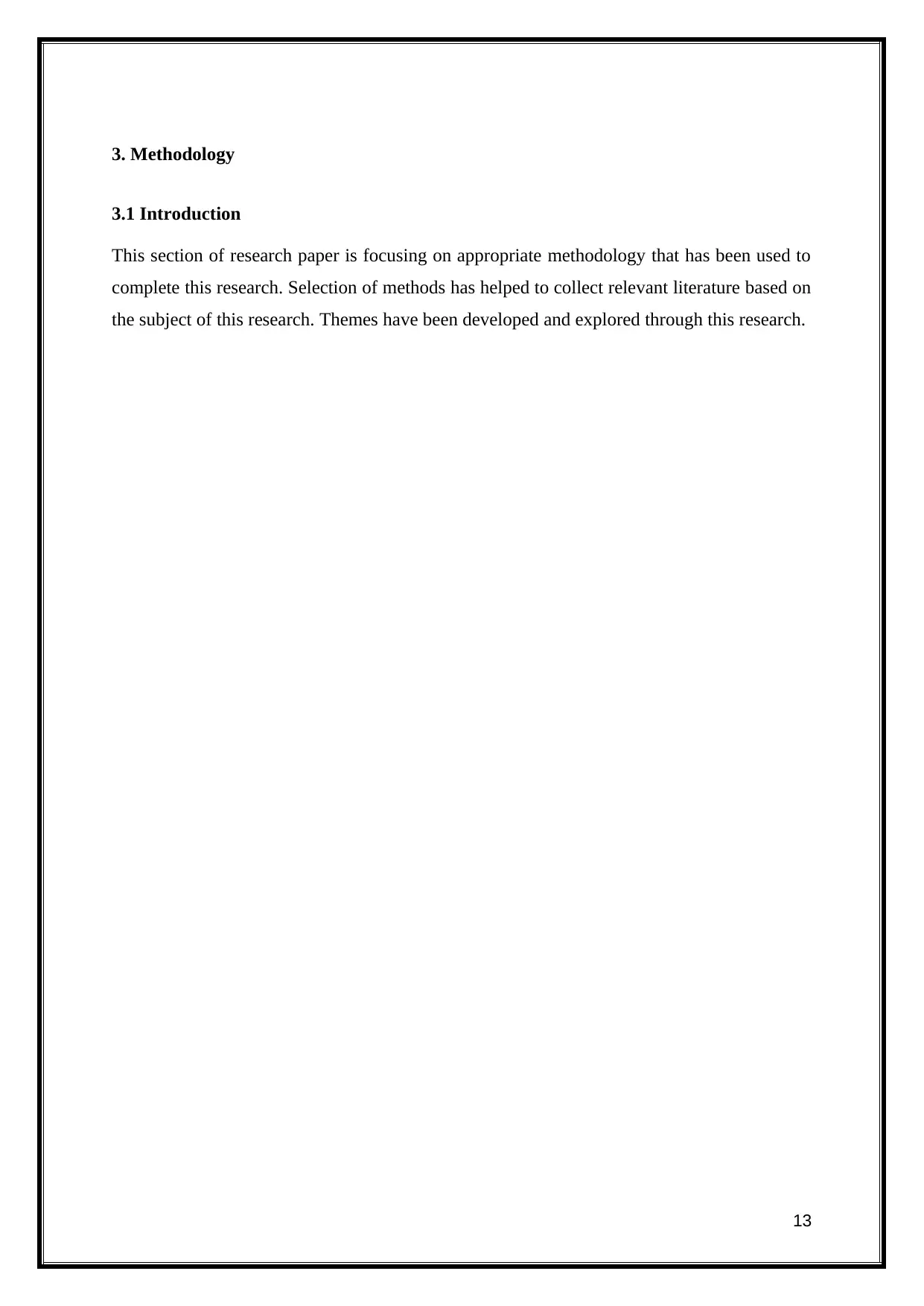
3. Methodology
3.1 Introduction
This section of research paper is focusing on appropriate methodology that has been used to
complete this research. Selection of methods has helped to collect relevant literature based on
the subject of this research. Themes have been developed and explored through this research.
13
3.1 Introduction
This section of research paper is focusing on appropriate methodology that has been used to
complete this research. Selection of methods has helped to collect relevant literature based on
the subject of this research. Themes have been developed and explored through this research.
13
Paraphrase This Document
Need a fresh take? Get an instant paraphrase of this document with our AI Paraphraser
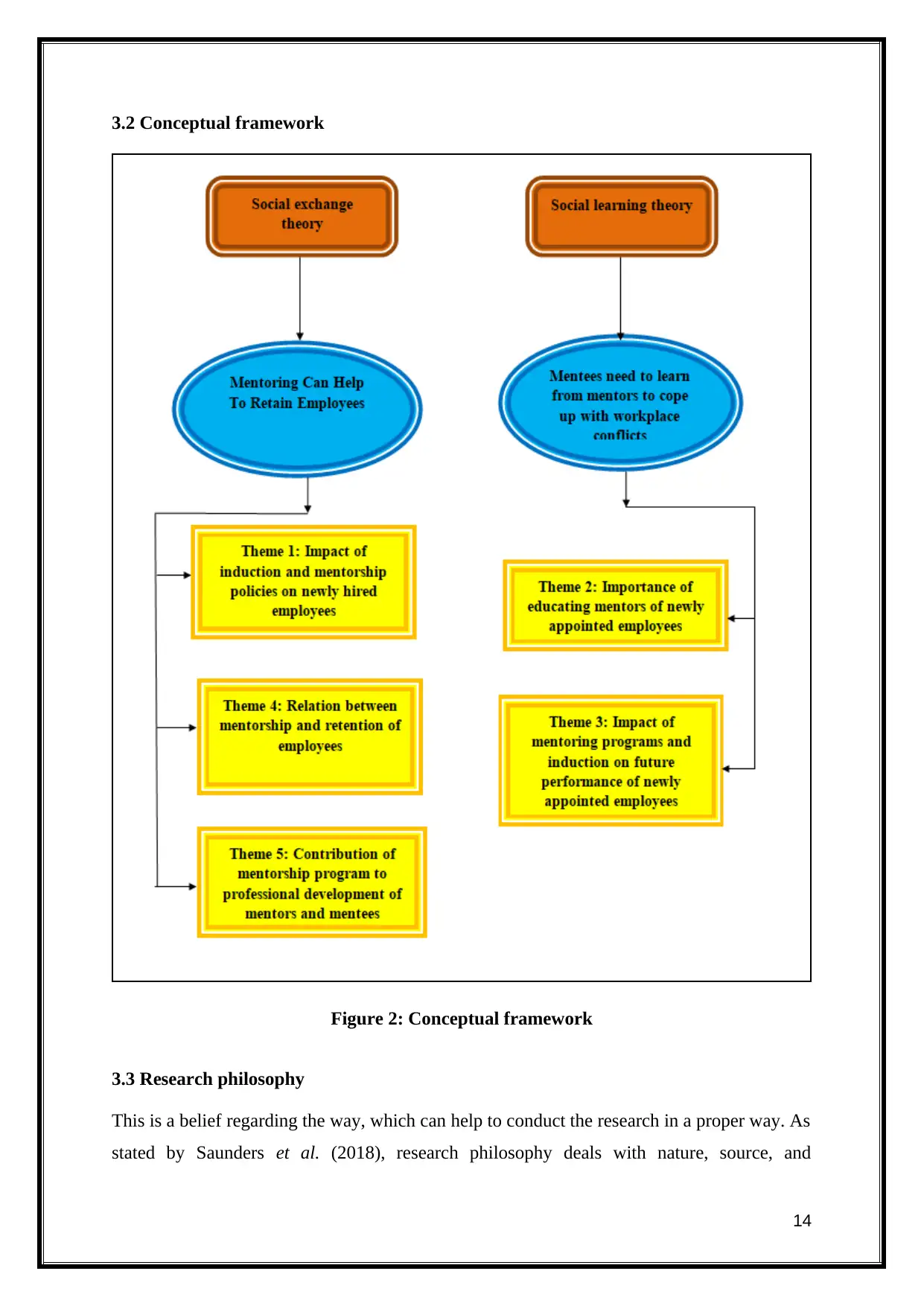
3.2 Conceptual framework
Figure 2: Conceptual framework
3.3 Research philosophy
This is a belief regarding the way, which can help to conduct the research in a proper way. As
stated by Saunders et al. (2018), research philosophy deals with nature, source, and
14
Figure 2: Conceptual framework
3.3 Research philosophy
This is a belief regarding the way, which can help to conduct the research in a proper way. As
stated by Saunders et al. (2018), research philosophy deals with nature, source, and
14
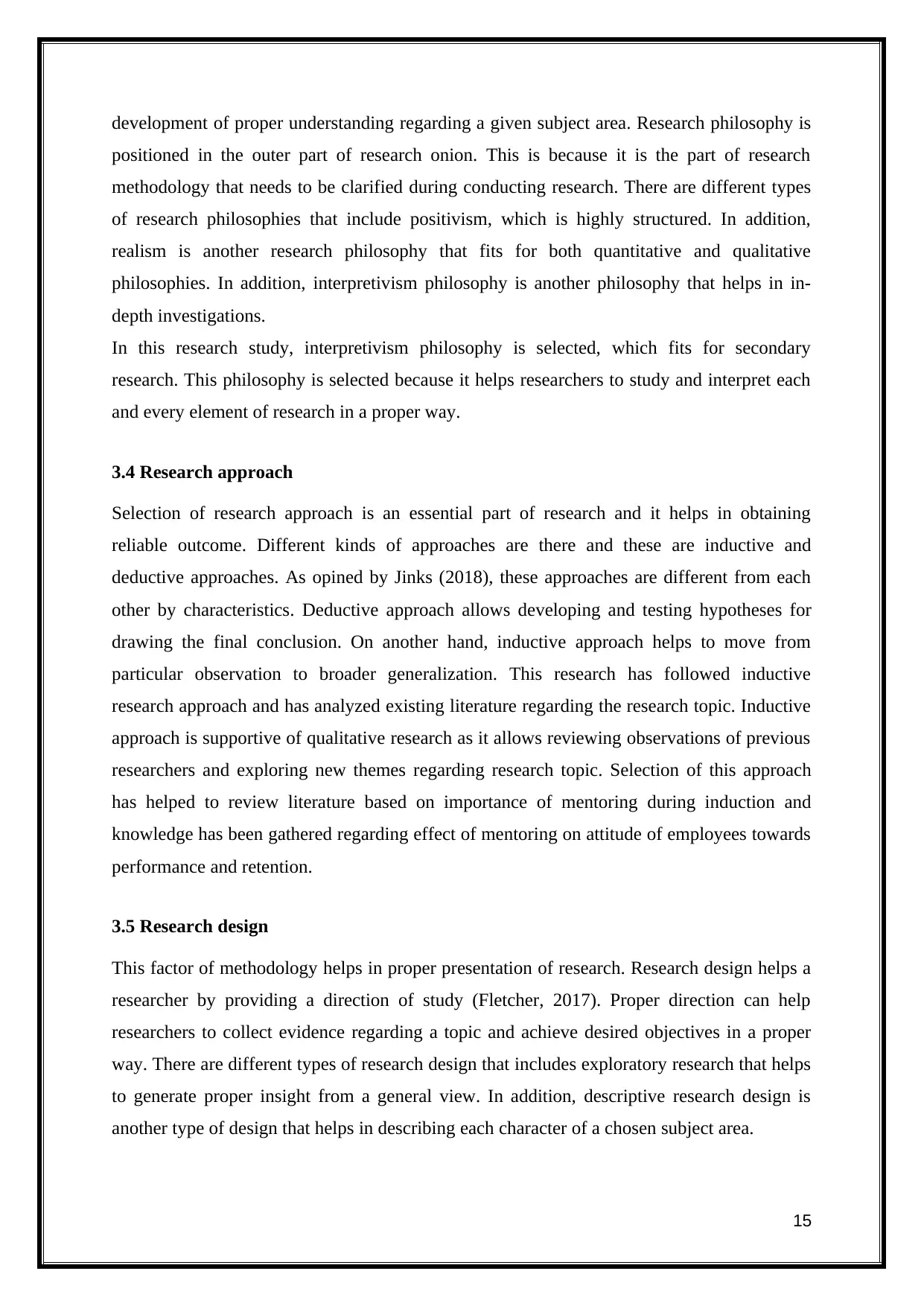
development of proper understanding regarding a given subject area. Research philosophy is
positioned in the outer part of research onion. This is because it is the part of research
methodology that needs to be clarified during conducting research. There are different types
of research philosophies that include positivism, which is highly structured. In addition,
realism is another research philosophy that fits for both quantitative and qualitative
philosophies. In addition, interpretivism philosophy is another philosophy that helps in in-
depth investigations.
In this research study, interpretivism philosophy is selected, which fits for secondary
research. This philosophy is selected because it helps researchers to study and interpret each
and every element of research in a proper way.
3.4 Research approach
Selection of research approach is an essential part of research and it helps in obtaining
reliable outcome. Different kinds of approaches are there and these are inductive and
deductive approaches. As opined by Jinks (2018), these approaches are different from each
other by characteristics. Deductive approach allows developing and testing hypotheses for
drawing the final conclusion. On another hand, inductive approach helps to move from
particular observation to broader generalization. This research has followed inductive
research approach and has analyzed existing literature regarding the research topic. Inductive
approach is supportive of qualitative research as it allows reviewing observations of previous
researchers and exploring new themes regarding research topic. Selection of this approach
has helped to review literature based on importance of mentoring during induction and
knowledge has been gathered regarding effect of mentoring on attitude of employees towards
performance and retention.
3.5 Research design
This factor of methodology helps in proper presentation of research. Research design helps a
researcher by providing a direction of study (Fletcher, 2017). Proper direction can help
researchers to collect evidence regarding a topic and achieve desired objectives in a proper
way. There are different types of research design that includes exploratory research that helps
to generate proper insight from a general view. In addition, descriptive research design is
another type of design that helps in describing each character of a chosen subject area.
15
positioned in the outer part of research onion. This is because it is the part of research
methodology that needs to be clarified during conducting research. There are different types
of research philosophies that include positivism, which is highly structured. In addition,
realism is another research philosophy that fits for both quantitative and qualitative
philosophies. In addition, interpretivism philosophy is another philosophy that helps in in-
depth investigations.
In this research study, interpretivism philosophy is selected, which fits for secondary
research. This philosophy is selected because it helps researchers to study and interpret each
and every element of research in a proper way.
3.4 Research approach
Selection of research approach is an essential part of research and it helps in obtaining
reliable outcome. Different kinds of approaches are there and these are inductive and
deductive approaches. As opined by Jinks (2018), these approaches are different from each
other by characteristics. Deductive approach allows developing and testing hypotheses for
drawing the final conclusion. On another hand, inductive approach helps to move from
particular observation to broader generalization. This research has followed inductive
research approach and has analyzed existing literature regarding the research topic. Inductive
approach is supportive of qualitative research as it allows reviewing observations of previous
researchers and exploring new themes regarding research topic. Selection of this approach
has helped to review literature based on importance of mentoring during induction and
knowledge has been gathered regarding effect of mentoring on attitude of employees towards
performance and retention.
3.5 Research design
This factor of methodology helps in proper presentation of research. Research design helps a
researcher by providing a direction of study (Fletcher, 2017). Proper direction can help
researchers to collect evidence regarding a topic and achieve desired objectives in a proper
way. There are different types of research design that includes exploratory research that helps
to generate proper insight from a general view. In addition, descriptive research design is
another type of design that helps in describing each character of a chosen subject area.
15
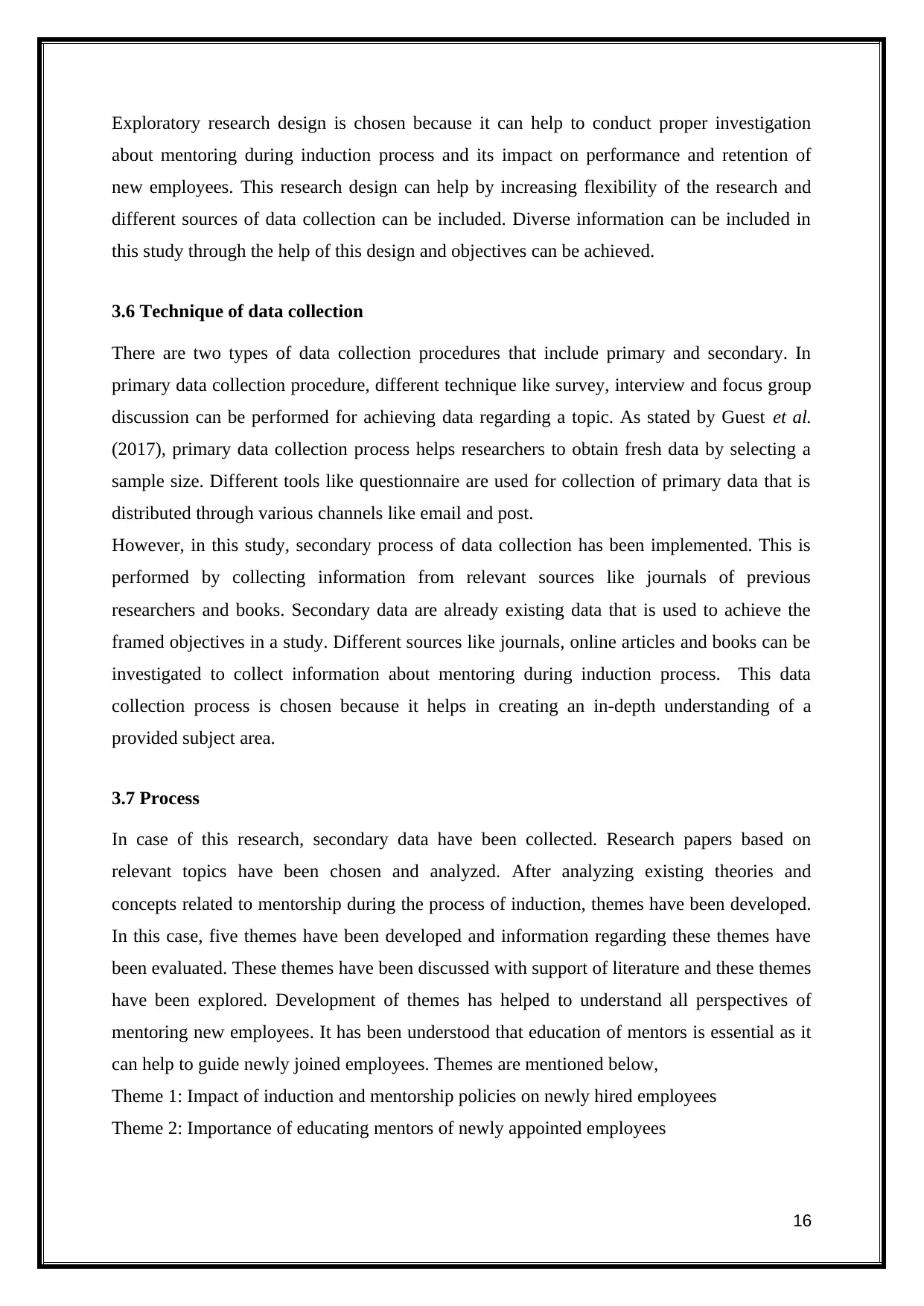
Exploratory research design is chosen because it can help to conduct proper investigation
about mentoring during induction process and its impact on performance and retention of
new employees. This research design can help by increasing flexibility of the research and
different sources of data collection can be included. Diverse information can be included in
this study through the help of this design and objectives can be achieved.
3.6 Technique of data collection
There are two types of data collection procedures that include primary and secondary. In
primary data collection procedure, different technique like survey, interview and focus group
discussion can be performed for achieving data regarding a topic. As stated by Guest et al.
(2017), primary data collection process helps researchers to obtain fresh data by selecting a
sample size. Different tools like questionnaire are used for collection of primary data that is
distributed through various channels like email and post.
However, in this study, secondary process of data collection has been implemented. This is
performed by collecting information from relevant sources like journals of previous
researchers and books. Secondary data are already existing data that is used to achieve the
framed objectives in a study. Different sources like journals, online articles and books can be
investigated to collect information about mentoring during induction process. This data
collection process is chosen because it helps in creating an in-depth understanding of a
provided subject area.
3.7 Process
In case of this research, secondary data have been collected. Research papers based on
relevant topics have been chosen and analyzed. After analyzing existing theories and
concepts related to mentorship during the process of induction, themes have been developed.
In this case, five themes have been developed and information regarding these themes have
been evaluated. These themes have been discussed with support of literature and these themes
have been explored. Development of themes has helped to understand all perspectives of
mentoring new employees. It has been understood that education of mentors is essential as it
can help to guide newly joined employees. Themes are mentioned below,
Theme 1: Impact of induction and mentorship policies on newly hired employees
Theme 2: Importance of educating mentors of newly appointed employees
16
about mentoring during induction process and its impact on performance and retention of
new employees. This research design can help by increasing flexibility of the research and
different sources of data collection can be included. Diverse information can be included in
this study through the help of this design and objectives can be achieved.
3.6 Technique of data collection
There are two types of data collection procedures that include primary and secondary. In
primary data collection procedure, different technique like survey, interview and focus group
discussion can be performed for achieving data regarding a topic. As stated by Guest et al.
(2017), primary data collection process helps researchers to obtain fresh data by selecting a
sample size. Different tools like questionnaire are used for collection of primary data that is
distributed through various channels like email and post.
However, in this study, secondary process of data collection has been implemented. This is
performed by collecting information from relevant sources like journals of previous
researchers and books. Secondary data are already existing data that is used to achieve the
framed objectives in a study. Different sources like journals, online articles and books can be
investigated to collect information about mentoring during induction process. This data
collection process is chosen because it helps in creating an in-depth understanding of a
provided subject area.
3.7 Process
In case of this research, secondary data have been collected. Research papers based on
relevant topics have been chosen and analyzed. After analyzing existing theories and
concepts related to mentorship during the process of induction, themes have been developed.
In this case, five themes have been developed and information regarding these themes have
been evaluated. These themes have been discussed with support of literature and these themes
have been explored. Development of themes has helped to understand all perspectives of
mentoring new employees. It has been understood that education of mentors is essential as it
can help to guide newly joined employees. Themes are mentioned below,
Theme 1: Impact of induction and mentorship policies on newly hired employees
Theme 2: Importance of educating mentors of newly appointed employees
16
Secure Best Marks with AI Grader
Need help grading? Try our AI Grader for instant feedback on your assignments.
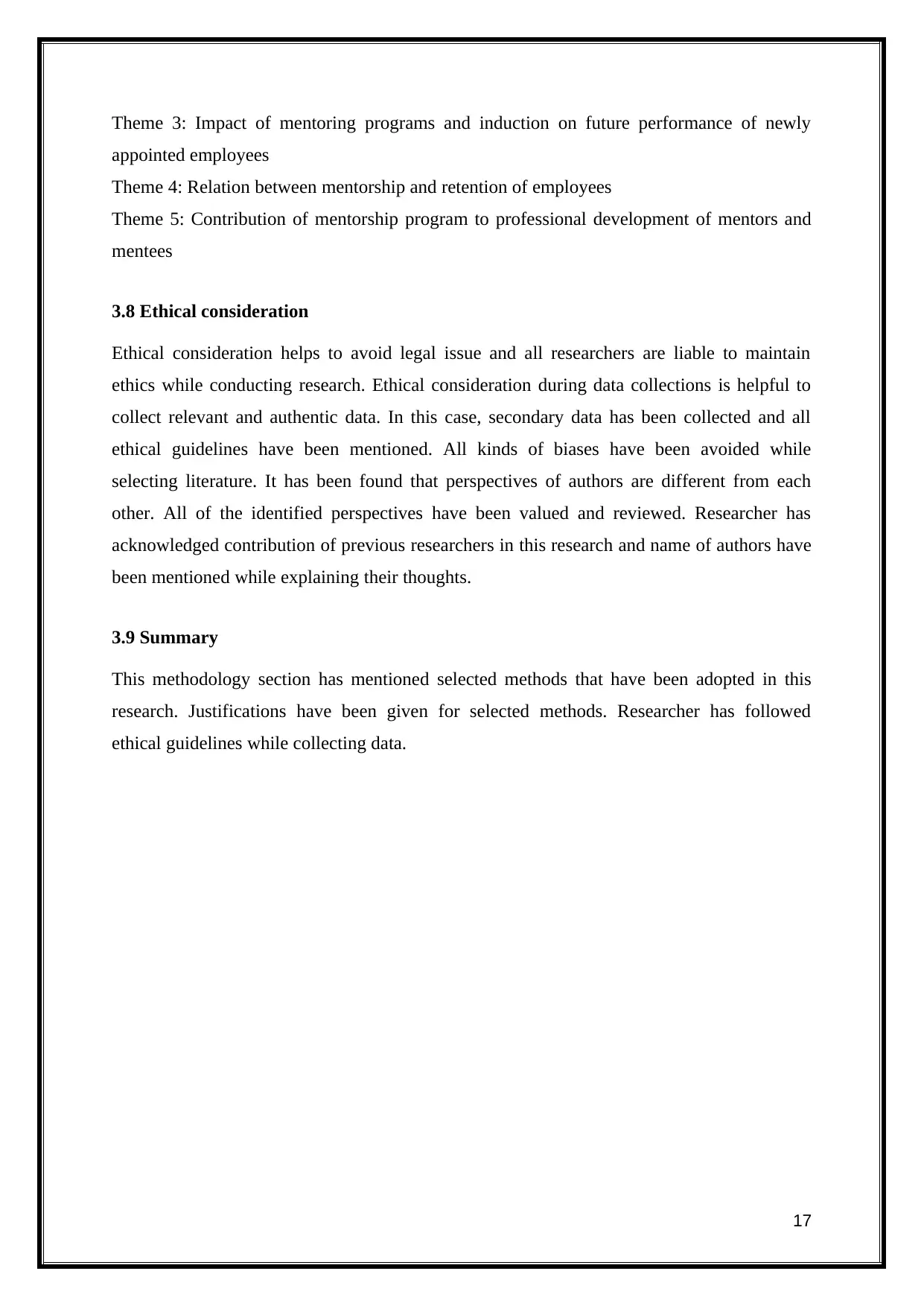
Theme 3: Impact of mentoring programs and induction on future performance of newly
appointed employees
Theme 4: Relation between mentorship and retention of employees
Theme 5: Contribution of mentorship program to professional development of mentors and
mentees
3.8 Ethical consideration
Ethical consideration helps to avoid legal issue and all researchers are liable to maintain
ethics while conducting research. Ethical consideration during data collections is helpful to
collect relevant and authentic data. In this case, secondary data has been collected and all
ethical guidelines have been mentioned. All kinds of biases have been avoided while
selecting literature. It has been found that perspectives of authors are different from each
other. All of the identified perspectives have been valued and reviewed. Researcher has
acknowledged contribution of previous researchers in this research and name of authors have
been mentioned while explaining their thoughts.
3.9 Summary
This methodology section has mentioned selected methods that have been adopted in this
research. Justifications have been given for selected methods. Researcher has followed
ethical guidelines while collecting data.
17
appointed employees
Theme 4: Relation between mentorship and retention of employees
Theme 5: Contribution of mentorship program to professional development of mentors and
mentees
3.8 Ethical consideration
Ethical consideration helps to avoid legal issue and all researchers are liable to maintain
ethics while conducting research. Ethical consideration during data collections is helpful to
collect relevant and authentic data. In this case, secondary data has been collected and all
ethical guidelines have been mentioned. All kinds of biases have been avoided while
selecting literature. It has been found that perspectives of authors are different from each
other. All of the identified perspectives have been valued and reviewed. Researcher has
acknowledged contribution of previous researchers in this research and name of authors have
been mentioned while explaining their thoughts.
3.9 Summary
This methodology section has mentioned selected methods that have been adopted in this
research. Justifications have been given for selected methods. Researcher has followed
ethical guidelines while collecting data.
17
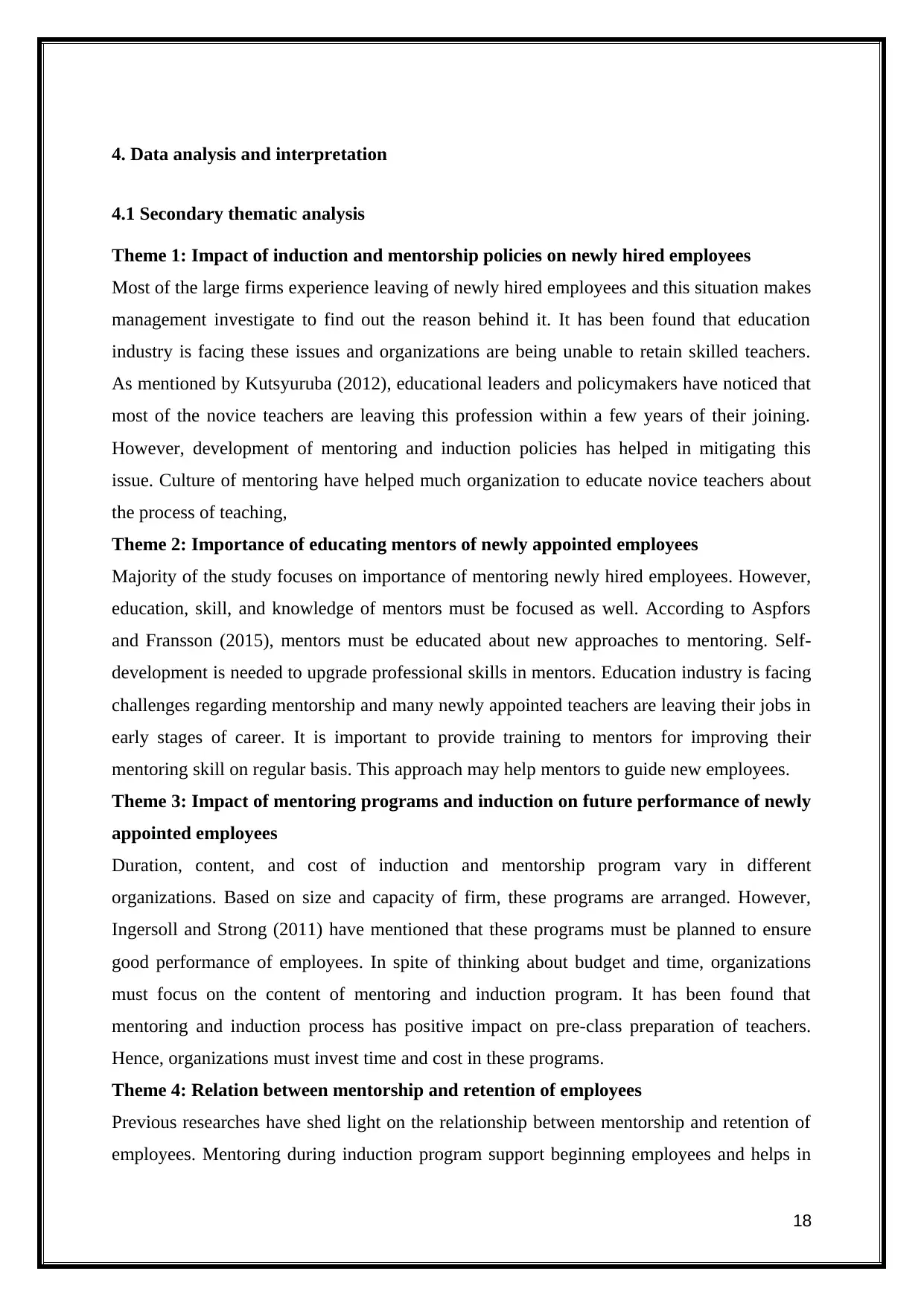
4. Data analysis and interpretation
4.1 Secondary thematic analysis
Theme 1: Impact of induction and mentorship policies on newly hired employees
Most of the large firms experience leaving of newly hired employees and this situation makes
management investigate to find out the reason behind it. It has been found that education
industry is facing these issues and organizations are being unable to retain skilled teachers.
As mentioned by Kutsyuruba (2012), educational leaders and policymakers have noticed that
most of the novice teachers are leaving this profession within a few years of their joining.
However, development of mentoring and induction policies has helped in mitigating this
issue. Culture of mentoring have helped much organization to educate novice teachers about
the process of teaching,
Theme 2: Importance of educating mentors of newly appointed employees
Majority of the study focuses on importance of mentoring newly hired employees. However,
education, skill, and knowledge of mentors must be focused as well. According to Aspfors
and Fransson (2015), mentors must be educated about new approaches to mentoring. Self-
development is needed to upgrade professional skills in mentors. Education industry is facing
challenges regarding mentorship and many newly appointed teachers are leaving their jobs in
early stages of career. It is important to provide training to mentors for improving their
mentoring skill on regular basis. This approach may help mentors to guide new employees.
Theme 3: Impact of mentoring programs and induction on future performance of newly
appointed employees
Duration, content, and cost of induction and mentorship program vary in different
organizations. Based on size and capacity of firm, these programs are arranged. However,
Ingersoll and Strong (2011) have mentioned that these programs must be planned to ensure
good performance of employees. In spite of thinking about budget and time, organizations
must focus on the content of mentoring and induction program. It has been found that
mentoring and induction process has positive impact on pre-class preparation of teachers.
Hence, organizations must invest time and cost in these programs.
Theme 4: Relation between mentorship and retention of employees
Previous researches have shed light on the relationship between mentorship and retention of
employees. Mentoring during induction program support beginning employees and helps in
18
4.1 Secondary thematic analysis
Theme 1: Impact of induction and mentorship policies on newly hired employees
Most of the large firms experience leaving of newly hired employees and this situation makes
management investigate to find out the reason behind it. It has been found that education
industry is facing these issues and organizations are being unable to retain skilled teachers.
As mentioned by Kutsyuruba (2012), educational leaders and policymakers have noticed that
most of the novice teachers are leaving this profession within a few years of their joining.
However, development of mentoring and induction policies has helped in mitigating this
issue. Culture of mentoring have helped much organization to educate novice teachers about
the process of teaching,
Theme 2: Importance of educating mentors of newly appointed employees
Majority of the study focuses on importance of mentoring newly hired employees. However,
education, skill, and knowledge of mentors must be focused as well. According to Aspfors
and Fransson (2015), mentors must be educated about new approaches to mentoring. Self-
development is needed to upgrade professional skills in mentors. Education industry is facing
challenges regarding mentorship and many newly appointed teachers are leaving their jobs in
early stages of career. It is important to provide training to mentors for improving their
mentoring skill on regular basis. This approach may help mentors to guide new employees.
Theme 3: Impact of mentoring programs and induction on future performance of newly
appointed employees
Duration, content, and cost of induction and mentorship program vary in different
organizations. Based on size and capacity of firm, these programs are arranged. However,
Ingersoll and Strong (2011) have mentioned that these programs must be planned to ensure
good performance of employees. In spite of thinking about budget and time, organizations
must focus on the content of mentoring and induction program. It has been found that
mentoring and induction process has positive impact on pre-class preparation of teachers.
Hence, organizations must invest time and cost in these programs.
Theme 4: Relation between mentorship and retention of employees
Previous researches have shed light on the relationship between mentorship and retention of
employees. Mentoring during induction program support beginning employees and helps in
18
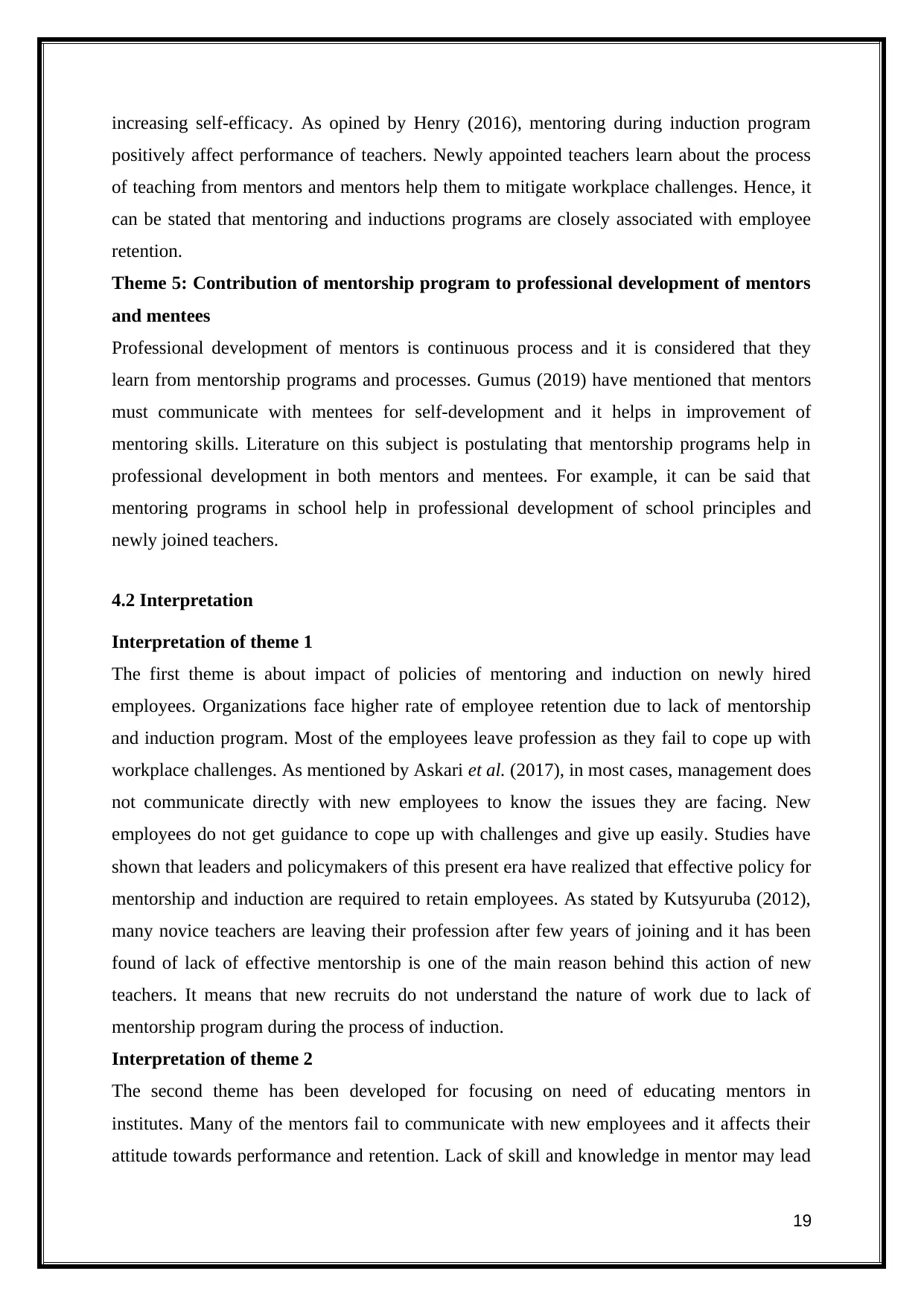
increasing self-efficacy. As opined by Henry (2016), mentoring during induction program
positively affect performance of teachers. Newly appointed teachers learn about the process
of teaching from mentors and mentors help them to mitigate workplace challenges. Hence, it
can be stated that mentoring and inductions programs are closely associated with employee
retention.
Theme 5: Contribution of mentorship program to professional development of mentors
and mentees
Professional development of mentors is continuous process and it is considered that they
learn from mentorship programs and processes. Gumus (2019) have mentioned that mentors
must communicate with mentees for self-development and it helps in improvement of
mentoring skills. Literature on this subject is postulating that mentorship programs help in
professional development in both mentors and mentees. For example, it can be said that
mentoring programs in school help in professional development of school principles and
newly joined teachers.
4.2 Interpretation
Interpretation of theme 1
The first theme is about impact of policies of mentoring and induction on newly hired
employees. Organizations face higher rate of employee retention due to lack of mentorship
and induction program. Most of the employees leave profession as they fail to cope up with
workplace challenges. As mentioned by Askari et al. (2017), in most cases, management does
not communicate directly with new employees to know the issues they are facing. New
employees do not get guidance to cope up with challenges and give up easily. Studies have
shown that leaders and policymakers of this present era have realized that effective policy for
mentorship and induction are required to retain employees. As stated by Kutsyuruba (2012),
many novice teachers are leaving their profession after few years of joining and it has been
found of lack of effective mentorship is one of the main reason behind this action of new
teachers. It means that new recruits do not understand the nature of work due to lack of
mentorship program during the process of induction.
Interpretation of theme 2
The second theme has been developed for focusing on need of educating mentors in
institutes. Many of the mentors fail to communicate with new employees and it affects their
attitude towards performance and retention. Lack of skill and knowledge in mentor may lead
19
positively affect performance of teachers. Newly appointed teachers learn about the process
of teaching from mentors and mentors help them to mitigate workplace challenges. Hence, it
can be stated that mentoring and inductions programs are closely associated with employee
retention.
Theme 5: Contribution of mentorship program to professional development of mentors
and mentees
Professional development of mentors is continuous process and it is considered that they
learn from mentorship programs and processes. Gumus (2019) have mentioned that mentors
must communicate with mentees for self-development and it helps in improvement of
mentoring skills. Literature on this subject is postulating that mentorship programs help in
professional development in both mentors and mentees. For example, it can be said that
mentoring programs in school help in professional development of school principles and
newly joined teachers.
4.2 Interpretation
Interpretation of theme 1
The first theme is about impact of policies of mentoring and induction on newly hired
employees. Organizations face higher rate of employee retention due to lack of mentorship
and induction program. Most of the employees leave profession as they fail to cope up with
workplace challenges. As mentioned by Askari et al. (2017), in most cases, management does
not communicate directly with new employees to know the issues they are facing. New
employees do not get guidance to cope up with challenges and give up easily. Studies have
shown that leaders and policymakers of this present era have realized that effective policy for
mentorship and induction are required to retain employees. As stated by Kutsyuruba (2012),
many novice teachers are leaving their profession after few years of joining and it has been
found of lack of effective mentorship is one of the main reason behind this action of new
teachers. It means that new recruits do not understand the nature of work due to lack of
mentorship program during the process of induction.
Interpretation of theme 2
The second theme has been developed for focusing on need of educating mentors in
institutes. Many of the mentors fail to communicate with new employees and it affects their
attitude towards performance and retention. Lack of skill and knowledge in mentor may lead
19
Paraphrase This Document
Need a fresh take? Get an instant paraphrase of this document with our AI Paraphraser
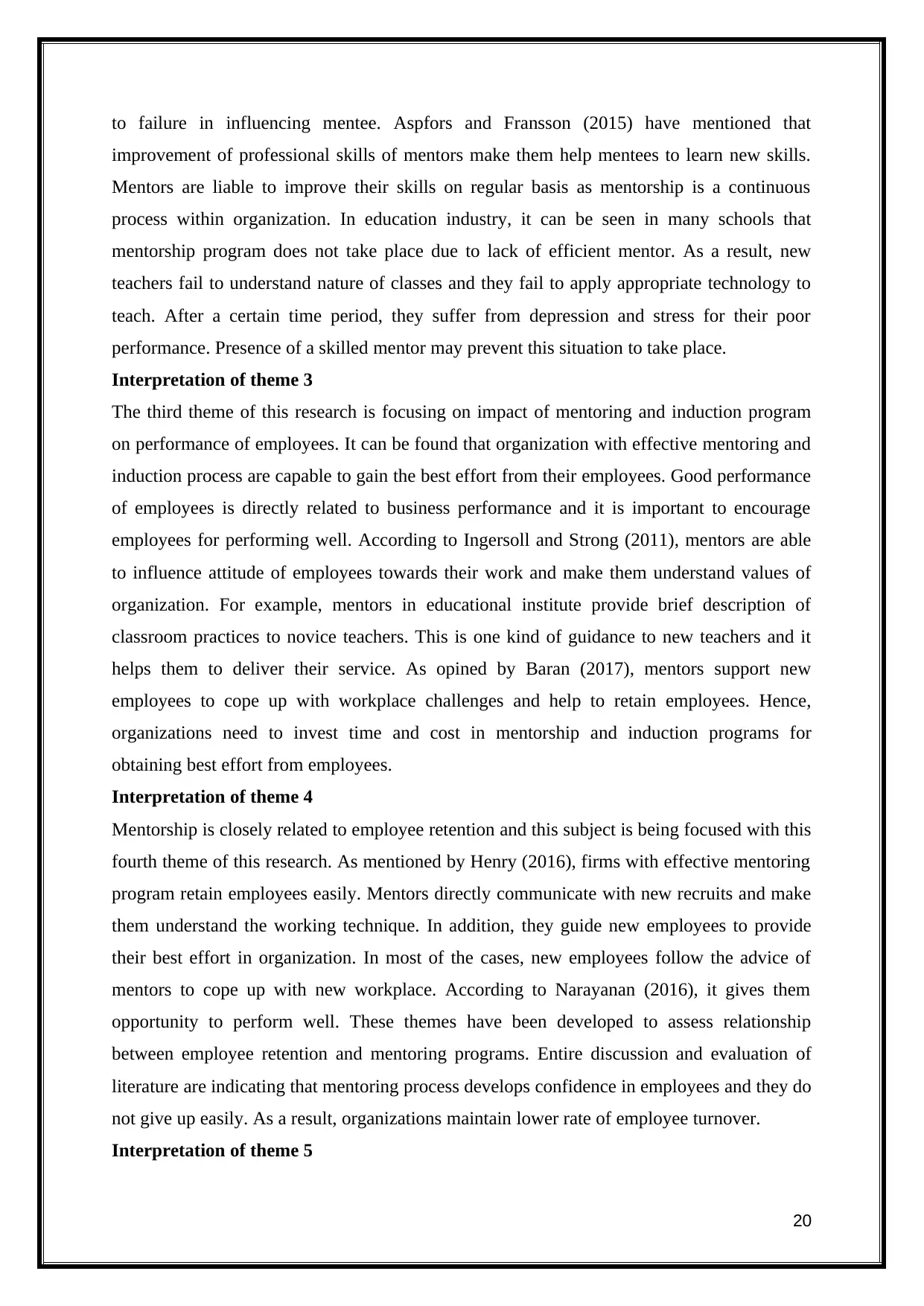
to failure in influencing mentee. Aspfors and Fransson (2015) have mentioned that
improvement of professional skills of mentors make them help mentees to learn new skills.
Mentors are liable to improve their skills on regular basis as mentorship is a continuous
process within organization. In education industry, it can be seen in many schools that
mentorship program does not take place due to lack of efficient mentor. As a result, new
teachers fail to understand nature of classes and they fail to apply appropriate technology to
teach. After a certain time period, they suffer from depression and stress for their poor
performance. Presence of a skilled mentor may prevent this situation to take place.
Interpretation of theme 3
The third theme of this research is focusing on impact of mentoring and induction program
on performance of employees. It can be found that organization with effective mentoring and
induction process are capable to gain the best effort from their employees. Good performance
of employees is directly related to business performance and it is important to encourage
employees for performing well. According to Ingersoll and Strong (2011), mentors are able
to influence attitude of employees towards their work and make them understand values of
organization. For example, mentors in educational institute provide brief description of
classroom practices to novice teachers. This is one kind of guidance to new teachers and it
helps them to deliver their service. As opined by Baran (2017), mentors support new
employees to cope up with workplace challenges and help to retain employees. Hence,
organizations need to invest time and cost in mentorship and induction programs for
obtaining best effort from employees.
Interpretation of theme 4
Mentorship is closely related to employee retention and this subject is being focused with this
fourth theme of this research. As mentioned by Henry (2016), firms with effective mentoring
program retain employees easily. Mentors directly communicate with new recruits and make
them understand the working technique. In addition, they guide new employees to provide
their best effort in organization. In most of the cases, new employees follow the advice of
mentors to cope up with new workplace. According to Narayanan (2016), it gives them
opportunity to perform well. These themes have been developed to assess relationship
between employee retention and mentoring programs. Entire discussion and evaluation of
literature are indicating that mentoring process develops confidence in employees and they do
not give up easily. As a result, organizations maintain lower rate of employee turnover.
Interpretation of theme 5
20
improvement of professional skills of mentors make them help mentees to learn new skills.
Mentors are liable to improve their skills on regular basis as mentorship is a continuous
process within organization. In education industry, it can be seen in many schools that
mentorship program does not take place due to lack of efficient mentor. As a result, new
teachers fail to understand nature of classes and they fail to apply appropriate technology to
teach. After a certain time period, they suffer from depression and stress for their poor
performance. Presence of a skilled mentor may prevent this situation to take place.
Interpretation of theme 3
The third theme of this research is focusing on impact of mentoring and induction program
on performance of employees. It can be found that organization with effective mentoring and
induction process are capable to gain the best effort from their employees. Good performance
of employees is directly related to business performance and it is important to encourage
employees for performing well. According to Ingersoll and Strong (2011), mentors are able
to influence attitude of employees towards their work and make them understand values of
organization. For example, mentors in educational institute provide brief description of
classroom practices to novice teachers. This is one kind of guidance to new teachers and it
helps them to deliver their service. As opined by Baran (2017), mentors support new
employees to cope up with workplace challenges and help to retain employees. Hence,
organizations need to invest time and cost in mentorship and induction programs for
obtaining best effort from employees.
Interpretation of theme 4
Mentorship is closely related to employee retention and this subject is being focused with this
fourth theme of this research. As mentioned by Henry (2016), firms with effective mentoring
program retain employees easily. Mentors directly communicate with new recruits and make
them understand the working technique. In addition, they guide new employees to provide
their best effort in organization. In most of the cases, new employees follow the advice of
mentors to cope up with new workplace. According to Narayanan (2016), it gives them
opportunity to perform well. These themes have been developed to assess relationship
between employee retention and mentoring programs. Entire discussion and evaluation of
literature are indicating that mentoring process develops confidence in employees and they do
not give up easily. As a result, organizations maintain lower rate of employee turnover.
Interpretation of theme 5
20
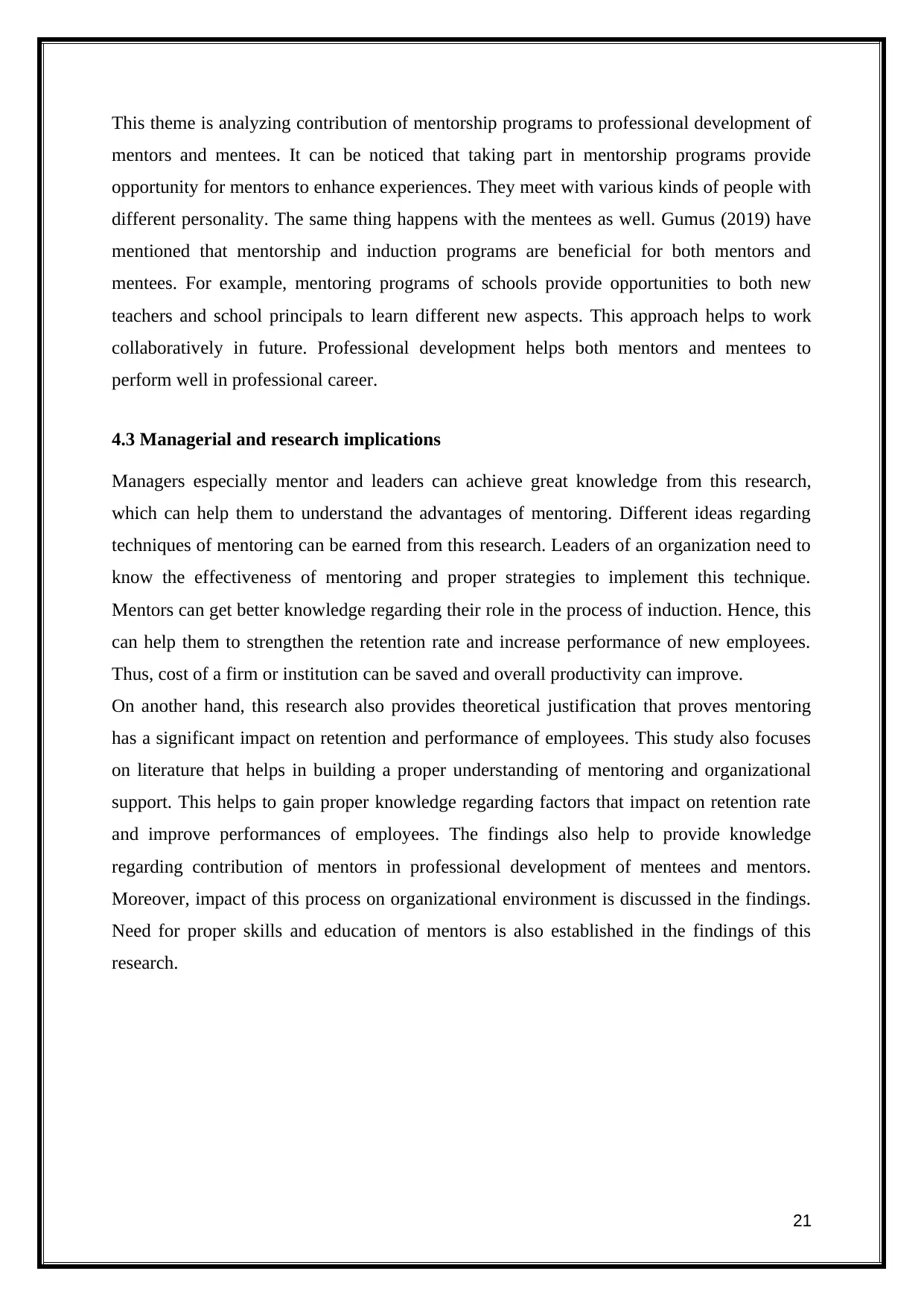
This theme is analyzing contribution of mentorship programs to professional development of
mentors and mentees. It can be noticed that taking part in mentorship programs provide
opportunity for mentors to enhance experiences. They meet with various kinds of people with
different personality. The same thing happens with the mentees as well. Gumus (2019) have
mentioned that mentorship and induction programs are beneficial for both mentors and
mentees. For example, mentoring programs of schools provide opportunities to both new
teachers and school principals to learn different new aspects. This approach helps to work
collaboratively in future. Professional development helps both mentors and mentees to
perform well in professional career.
4.3 Managerial and research implications
Managers especially mentor and leaders can achieve great knowledge from this research,
which can help them to understand the advantages of mentoring. Different ideas regarding
techniques of mentoring can be earned from this research. Leaders of an organization need to
know the effectiveness of mentoring and proper strategies to implement this technique.
Mentors can get better knowledge regarding their role in the process of induction. Hence, this
can help them to strengthen the retention rate and increase performance of new employees.
Thus, cost of a firm or institution can be saved and overall productivity can improve.
On another hand, this research also provides theoretical justification that proves mentoring
has a significant impact on retention and performance of employees. This study also focuses
on literature that helps in building a proper understanding of mentoring and organizational
support. This helps to gain proper knowledge regarding factors that impact on retention rate
and improve performances of employees. The findings also help to provide knowledge
regarding contribution of mentors in professional development of mentees and mentors.
Moreover, impact of this process on organizational environment is discussed in the findings.
Need for proper skills and education of mentors is also established in the findings of this
research.
21
mentors and mentees. It can be noticed that taking part in mentorship programs provide
opportunity for mentors to enhance experiences. They meet with various kinds of people with
different personality. The same thing happens with the mentees as well. Gumus (2019) have
mentioned that mentorship and induction programs are beneficial for both mentors and
mentees. For example, mentoring programs of schools provide opportunities to both new
teachers and school principals to learn different new aspects. This approach helps to work
collaboratively in future. Professional development helps both mentors and mentees to
perform well in professional career.
4.3 Managerial and research implications
Managers especially mentor and leaders can achieve great knowledge from this research,
which can help them to understand the advantages of mentoring. Different ideas regarding
techniques of mentoring can be earned from this research. Leaders of an organization need to
know the effectiveness of mentoring and proper strategies to implement this technique.
Mentors can get better knowledge regarding their role in the process of induction. Hence, this
can help them to strengthen the retention rate and increase performance of new employees.
Thus, cost of a firm or institution can be saved and overall productivity can improve.
On another hand, this research also provides theoretical justification that proves mentoring
has a significant impact on retention and performance of employees. This study also focuses
on literature that helps in building a proper understanding of mentoring and organizational
support. This helps to gain proper knowledge regarding factors that impact on retention rate
and improve performances of employees. The findings also help to provide knowledge
regarding contribution of mentors in professional development of mentees and mentors.
Moreover, impact of this process on organizational environment is discussed in the findings.
Need for proper skills and education of mentors is also established in the findings of this
research.
21
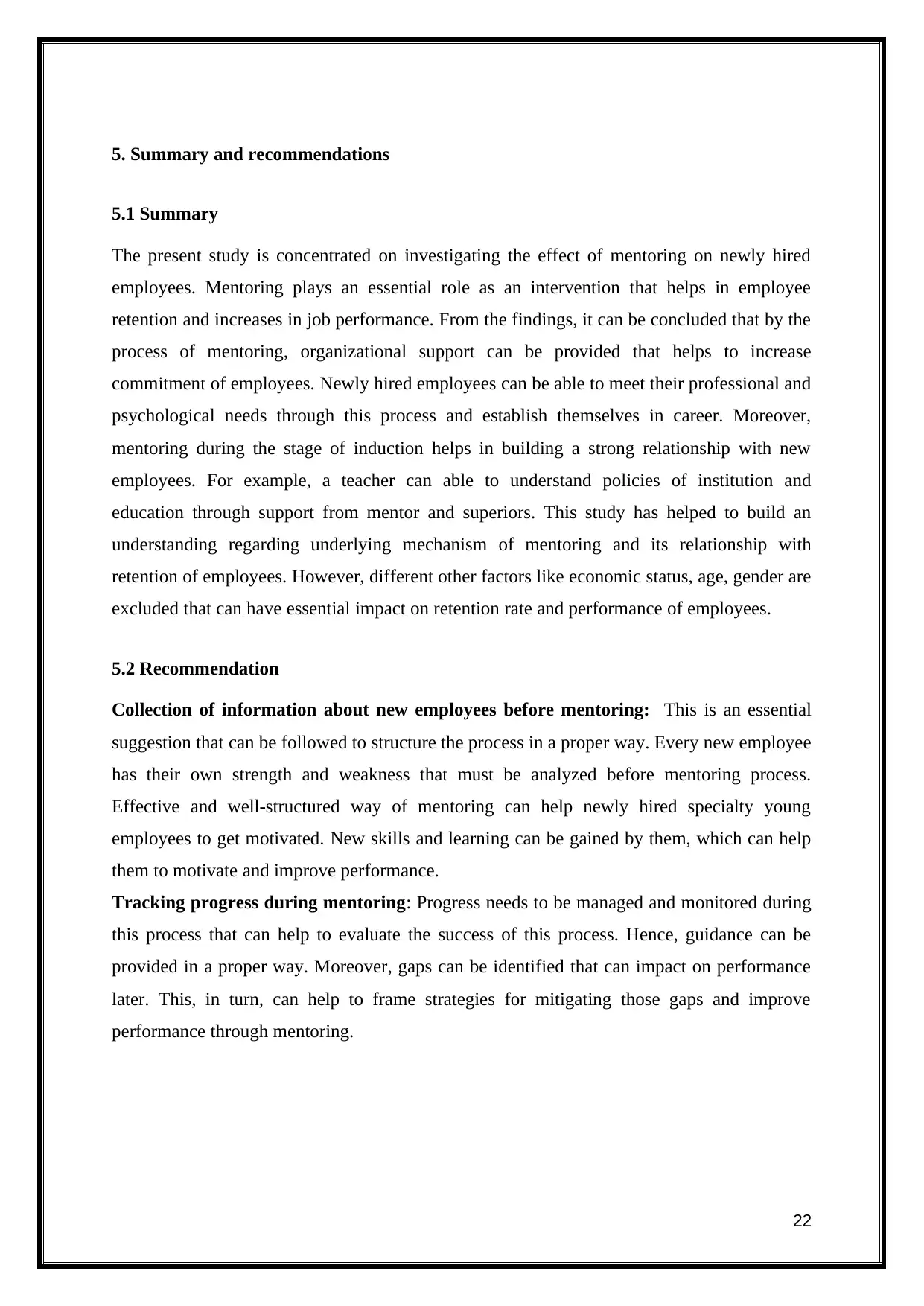
5. Summary and recommendations
5.1 Summary
The present study is concentrated on investigating the effect of mentoring on newly hired
employees. Mentoring plays an essential role as an intervention that helps in employee
retention and increases in job performance. From the findings, it can be concluded that by the
process of mentoring, organizational support can be provided that helps to increase
commitment of employees. Newly hired employees can be able to meet their professional and
psychological needs through this process and establish themselves in career. Moreover,
mentoring during the stage of induction helps in building a strong relationship with new
employees. For example, a teacher can able to understand policies of institution and
education through support from mentor and superiors. This study has helped to build an
understanding regarding underlying mechanism of mentoring and its relationship with
retention of employees. However, different other factors like economic status, age, gender are
excluded that can have essential impact on retention rate and performance of employees.
5.2 Recommendation
Collection of information about new employees before mentoring: This is an essential
suggestion that can be followed to structure the process in a proper way. Every new employee
has their own strength and weakness that must be analyzed before mentoring process.
Effective and well-structured way of mentoring can help newly hired specialty young
employees to get motivated. New skills and learning can be gained by them, which can help
them to motivate and improve performance.
Tracking progress during mentoring: Progress needs to be managed and monitored during
this process that can help to evaluate the success of this process. Hence, guidance can be
provided in a proper way. Moreover, gaps can be identified that can impact on performance
later. This, in turn, can help to frame strategies for mitigating those gaps and improve
performance through mentoring.
22
5.1 Summary
The present study is concentrated on investigating the effect of mentoring on newly hired
employees. Mentoring plays an essential role as an intervention that helps in employee
retention and increases in job performance. From the findings, it can be concluded that by the
process of mentoring, organizational support can be provided that helps to increase
commitment of employees. Newly hired employees can be able to meet their professional and
psychological needs through this process and establish themselves in career. Moreover,
mentoring during the stage of induction helps in building a strong relationship with new
employees. For example, a teacher can able to understand policies of institution and
education through support from mentor and superiors. This study has helped to build an
understanding regarding underlying mechanism of mentoring and its relationship with
retention of employees. However, different other factors like economic status, age, gender are
excluded that can have essential impact on retention rate and performance of employees.
5.2 Recommendation
Collection of information about new employees before mentoring: This is an essential
suggestion that can be followed to structure the process in a proper way. Every new employee
has their own strength and weakness that must be analyzed before mentoring process.
Effective and well-structured way of mentoring can help newly hired specialty young
employees to get motivated. New skills and learning can be gained by them, which can help
them to motivate and improve performance.
Tracking progress during mentoring: Progress needs to be managed and monitored during
this process that can help to evaluate the success of this process. Hence, guidance can be
provided in a proper way. Moreover, gaps can be identified that can impact on performance
later. This, in turn, can help to frame strategies for mitigating those gaps and improve
performance through mentoring.
22
Secure Best Marks with AI Grader
Need help grading? Try our AI Grader for instant feedback on your assignments.
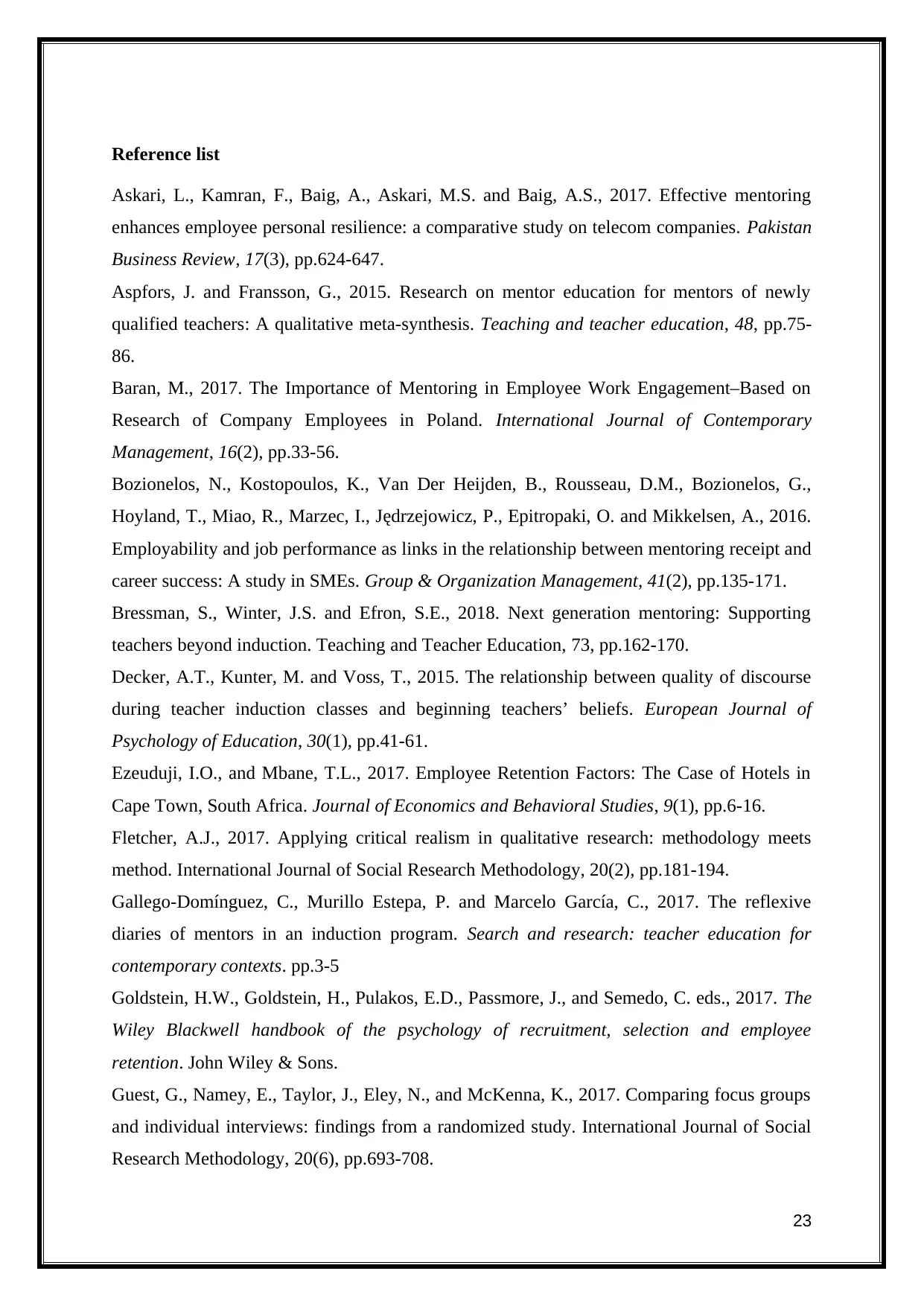
Reference list
Askari, L., Kamran, F., Baig, A., Askari, M.S. and Baig, A.S., 2017. Effective mentoring
enhances employee personal resilience: a comparative study on telecom companies. Pakistan
Business Review, 17(3), pp.624-647.
Aspfors, J. and Fransson, G., 2015. Research on mentor education for mentors of newly
qualified teachers: A qualitative meta-synthesis. Teaching and teacher education, 48, pp.75-
86.
Baran, M., 2017. The Importance of Mentoring in Employee Work Engagement–Based on
Research of Company Employees in Poland. International Journal of Contemporary
Management, 16(2), pp.33-56.
Bozionelos, N., Kostopoulos, K., Van Der Heijden, B., Rousseau, D.M., Bozionelos, G.,
Hoyland, T., Miao, R., Marzec, I., Jędrzejowicz, P., Epitropaki, O. and Mikkelsen, A., 2016.
Employability and job performance as links in the relationship between mentoring receipt and
career success: A study in SMEs. Group & Organization Management, 41(2), pp.135-171.
Bressman, S., Winter, J.S. and Efron, S.E., 2018. Next generation mentoring: Supporting
teachers beyond induction. Teaching and Teacher Education, 73, pp.162-170.
Decker, A.T., Kunter, M. and Voss, T., 2015. The relationship between quality of discourse
during teacher induction classes and beginning teachers’ beliefs. European Journal of
Psychology of Education, 30(1), pp.41-61.
Ezeuduji, I.O., and Mbane, T.L., 2017. Employee Retention Factors: The Case of Hotels in
Cape Town, South Africa. Journal of Economics and Behavioral Studies, 9(1), pp.6-16.
Fletcher, A.J., 2017. Applying critical realism in qualitative research: methodology meets
method. International Journal of Social Research Methodology, 20(2), pp.181-194.
Gallego-Domínguez, C., Murillo Estepa, P. and Marcelo García, C., 2017. The reflexive
diaries of mentors in an induction program. Search and research: teacher education for
contemporary contexts. pp.3-5
Goldstein, H.W., Goldstein, H., Pulakos, E.D., Passmore, J., and Semedo, C. eds., 2017. The
Wiley Blackwell handbook of the psychology of recruitment, selection and employee
retention. John Wiley & Sons.
Guest, G., Namey, E., Taylor, J., Eley, N., and McKenna, K., 2017. Comparing focus groups
and individual interviews: findings from a randomized study. International Journal of Social
Research Methodology, 20(6), pp.693-708.
23
Askari, L., Kamran, F., Baig, A., Askari, M.S. and Baig, A.S., 2017. Effective mentoring
enhances employee personal resilience: a comparative study on telecom companies. Pakistan
Business Review, 17(3), pp.624-647.
Aspfors, J. and Fransson, G., 2015. Research on mentor education for mentors of newly
qualified teachers: A qualitative meta-synthesis. Teaching and teacher education, 48, pp.75-
86.
Baran, M., 2017. The Importance of Mentoring in Employee Work Engagement–Based on
Research of Company Employees in Poland. International Journal of Contemporary
Management, 16(2), pp.33-56.
Bozionelos, N., Kostopoulos, K., Van Der Heijden, B., Rousseau, D.M., Bozionelos, G.,
Hoyland, T., Miao, R., Marzec, I., Jędrzejowicz, P., Epitropaki, O. and Mikkelsen, A., 2016.
Employability and job performance as links in the relationship between mentoring receipt and
career success: A study in SMEs. Group & Organization Management, 41(2), pp.135-171.
Bressman, S., Winter, J.S. and Efron, S.E., 2018. Next generation mentoring: Supporting
teachers beyond induction. Teaching and Teacher Education, 73, pp.162-170.
Decker, A.T., Kunter, M. and Voss, T., 2015. The relationship between quality of discourse
during teacher induction classes and beginning teachers’ beliefs. European Journal of
Psychology of Education, 30(1), pp.41-61.
Ezeuduji, I.O., and Mbane, T.L., 2017. Employee Retention Factors: The Case of Hotels in
Cape Town, South Africa. Journal of Economics and Behavioral Studies, 9(1), pp.6-16.
Fletcher, A.J., 2017. Applying critical realism in qualitative research: methodology meets
method. International Journal of Social Research Methodology, 20(2), pp.181-194.
Gallego-Domínguez, C., Murillo Estepa, P. and Marcelo García, C., 2017. The reflexive
diaries of mentors in an induction program. Search and research: teacher education for
contemporary contexts. pp.3-5
Goldstein, H.W., Goldstein, H., Pulakos, E.D., Passmore, J., and Semedo, C. eds., 2017. The
Wiley Blackwell handbook of the psychology of recruitment, selection and employee
retention. John Wiley & Sons.
Guest, G., Namey, E., Taylor, J., Eley, N., and McKenna, K., 2017. Comparing focus groups
and individual interviews: findings from a randomized study. International Journal of Social
Research Methodology, 20(6), pp.693-708.
23
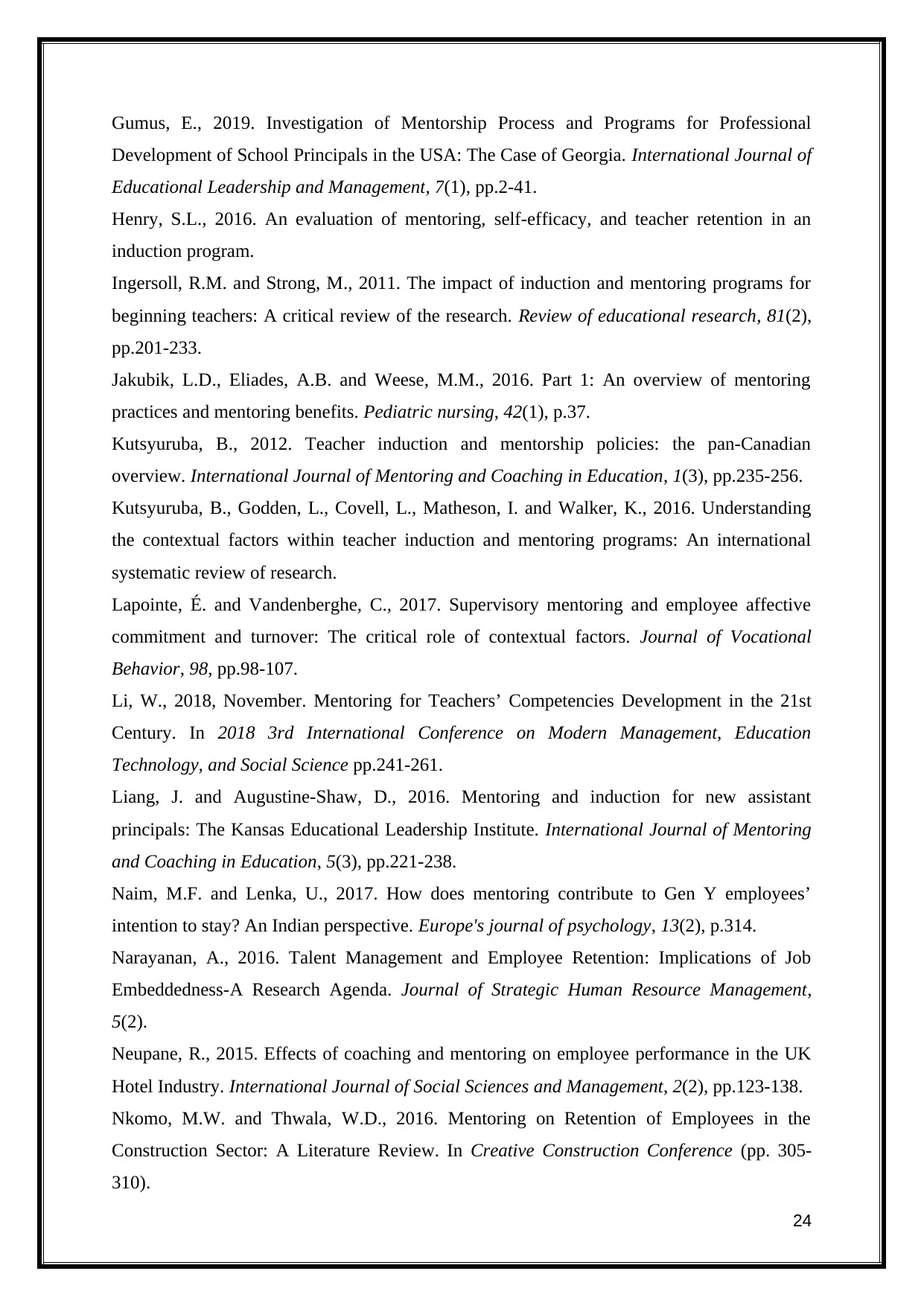
Gumus, E., 2019. Investigation of Mentorship Process and Programs for Professional
Development of School Principals in the USA: The Case of Georgia. International Journal of
Educational Leadership and Management, 7(1), pp.2-41.
Henry, S.L., 2016. An evaluation of mentoring, self-efficacy, and teacher retention in an
induction program.
Ingersoll, R.M. and Strong, M., 2011. The impact of induction and mentoring programs for
beginning teachers: A critical review of the research. Review of educational research, 81(2),
pp.201-233.
Jakubik, L.D., Eliades, A.B. and Weese, M.M., 2016. Part 1: An overview of mentoring
practices and mentoring benefits. Pediatric nursing, 42(1), p.37.
Kutsyuruba, B., 2012. Teacher induction and mentorship policies: the pan-Canadian
overview. International Journal of Mentoring and Coaching in Education, 1(3), pp.235-256.
Kutsyuruba, B., Godden, L., Covell, L., Matheson, I. and Walker, K., 2016. Understanding
the contextual factors within teacher induction and mentoring programs: An international
systematic review of research.
Lapointe, É. and Vandenberghe, C., 2017. Supervisory mentoring and employee affective
commitment and turnover: The critical role of contextual factors. Journal of Vocational
Behavior, 98, pp.98-107.
Li, W., 2018, November. Mentoring for Teachers’ Competencies Development in the 21st
Century. In 2018 3rd International Conference on Modern Management, Education
Technology, and Social Science pp.241-261.
Liang, J. and Augustine-Shaw, D., 2016. Mentoring and induction for new assistant
principals: The Kansas Educational Leadership Institute. International Journal of Mentoring
and Coaching in Education, 5(3), pp.221-238.
Naim, M.F. and Lenka, U., 2017. How does mentoring contribute to Gen Y employees’
intention to stay? An Indian perspective. Europe's journal of psychology, 13(2), p.314.
Narayanan, A., 2016. Talent Management and Employee Retention: Implications of Job
Embeddedness-A Research Agenda. Journal of Strategic Human Resource Management,
5(2).
Neupane, R., 2015. Effects of coaching and mentoring on employee performance in the UK
Hotel Industry. International Journal of Social Sciences and Management, 2(2), pp.123-138.
Nkomo, M.W. and Thwala, W.D., 2016. Mentoring on Retention of Employees in the
Construction Sector: A Literature Review. In Creative Construction Conference (pp. 305-
310).
24
Development of School Principals in the USA: The Case of Georgia. International Journal of
Educational Leadership and Management, 7(1), pp.2-41.
Henry, S.L., 2016. An evaluation of mentoring, self-efficacy, and teacher retention in an
induction program.
Ingersoll, R.M. and Strong, M., 2011. The impact of induction and mentoring programs for
beginning teachers: A critical review of the research. Review of educational research, 81(2),
pp.201-233.
Jakubik, L.D., Eliades, A.B. and Weese, M.M., 2016. Part 1: An overview of mentoring
practices and mentoring benefits. Pediatric nursing, 42(1), p.37.
Kutsyuruba, B., 2012. Teacher induction and mentorship policies: the pan-Canadian
overview. International Journal of Mentoring and Coaching in Education, 1(3), pp.235-256.
Kutsyuruba, B., Godden, L., Covell, L., Matheson, I. and Walker, K., 2016. Understanding
the contextual factors within teacher induction and mentoring programs: An international
systematic review of research.
Lapointe, É. and Vandenberghe, C., 2017. Supervisory mentoring and employee affective
commitment and turnover: The critical role of contextual factors. Journal of Vocational
Behavior, 98, pp.98-107.
Li, W., 2018, November. Mentoring for Teachers’ Competencies Development in the 21st
Century. In 2018 3rd International Conference on Modern Management, Education
Technology, and Social Science pp.241-261.
Liang, J. and Augustine-Shaw, D., 2016. Mentoring and induction for new assistant
principals: The Kansas Educational Leadership Institute. International Journal of Mentoring
and Coaching in Education, 5(3), pp.221-238.
Naim, M.F. and Lenka, U., 2017. How does mentoring contribute to Gen Y employees’
intention to stay? An Indian perspective. Europe's journal of psychology, 13(2), p.314.
Narayanan, A., 2016. Talent Management and Employee Retention: Implications of Job
Embeddedness-A Research Agenda. Journal of Strategic Human Resource Management,
5(2).
Neupane, R., 2015. Effects of coaching and mentoring on employee performance in the UK
Hotel Industry. International Journal of Social Sciences and Management, 2(2), pp.123-138.
Nkomo, M.W. and Thwala, W.D., 2016. Mentoring on Retention of Employees in the
Construction Sector: A Literature Review. In Creative Construction Conference (pp. 305-
310).
24
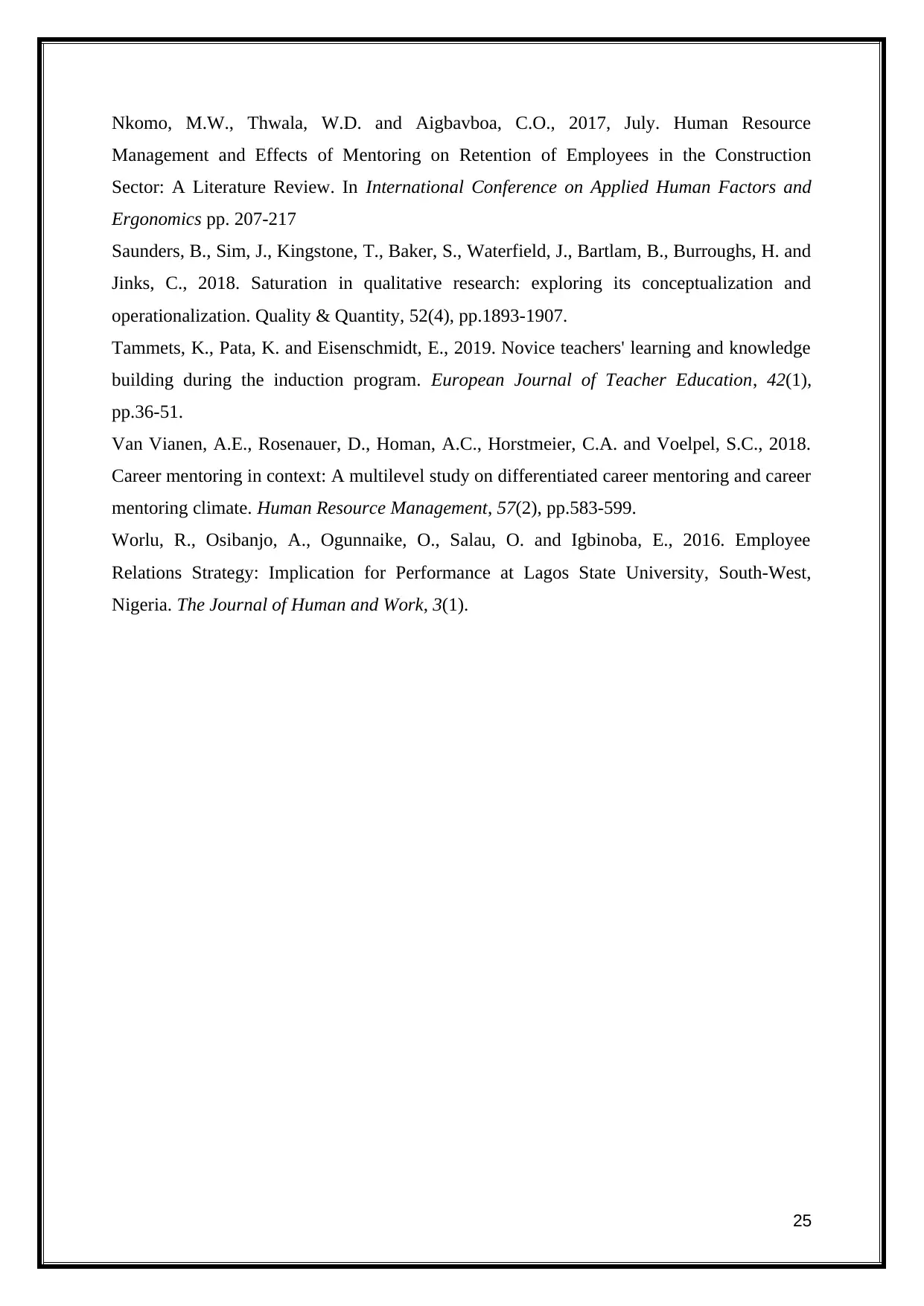
Nkomo, M.W., Thwala, W.D. and Aigbavboa, C.O., 2017, July. Human Resource
Management and Effects of Mentoring on Retention of Employees in the Construction
Sector: A Literature Review. In International Conference on Applied Human Factors and
Ergonomics pp. 207-217
Saunders, B., Sim, J., Kingstone, T., Baker, S., Waterfield, J., Bartlam, B., Burroughs, H. and
Jinks, C., 2018. Saturation in qualitative research: exploring its conceptualization and
operationalization. Quality & Quantity, 52(4), pp.1893-1907.
Tammets, K., Pata, K. and Eisenschmidt, E., 2019. Novice teachers' learning and knowledge
building during the induction program. European Journal of Teacher Education, 42(1),
pp.36-51.
Van Vianen, A.E., Rosenauer, D., Homan, A.C., Horstmeier, C.A. and Voelpel, S.C., 2018.
Career mentoring in context: A multilevel study on differentiated career mentoring and career
mentoring climate. Human Resource Management, 57(2), pp.583-599.
Worlu, R., Osibanjo, A., Ogunnaike, O., Salau, O. and Igbinoba, E., 2016. Employee
Relations Strategy: Implication for Performance at Lagos State University, South-West,
Nigeria. The Journal of Human and Work, 3(1).
25
Management and Effects of Mentoring on Retention of Employees in the Construction
Sector: A Literature Review. In International Conference on Applied Human Factors and
Ergonomics pp. 207-217
Saunders, B., Sim, J., Kingstone, T., Baker, S., Waterfield, J., Bartlam, B., Burroughs, H. and
Jinks, C., 2018. Saturation in qualitative research: exploring its conceptualization and
operationalization. Quality & Quantity, 52(4), pp.1893-1907.
Tammets, K., Pata, K. and Eisenschmidt, E., 2019. Novice teachers' learning and knowledge
building during the induction program. European Journal of Teacher Education, 42(1),
pp.36-51.
Van Vianen, A.E., Rosenauer, D., Homan, A.C., Horstmeier, C.A. and Voelpel, S.C., 2018.
Career mentoring in context: A multilevel study on differentiated career mentoring and career
mentoring climate. Human Resource Management, 57(2), pp.583-599.
Worlu, R., Osibanjo, A., Ogunnaike, O., Salau, O. and Igbinoba, E., 2016. Employee
Relations Strategy: Implication for Performance at Lagos State University, South-West,
Nigeria. The Journal of Human and Work, 3(1).
25
1 out of 25
Related Documents
Your All-in-One AI-Powered Toolkit for Academic Success.
+13062052269
info@desklib.com
Available 24*7 on WhatsApp / Email
![[object Object]](/_next/static/media/star-bottom.7253800d.svg)
Unlock your academic potential
© 2024 | Zucol Services PVT LTD | All rights reserved.





